
Dynamics

|
Generational Dynamics |
| Forecasting America's Destiny ... and the World's | |
| HOME WEB LOG COUNTRY WIKI COMMENT FORUM DOWNLOADS ABOUT | |
Thousands of refugees leave Libya for Italy, hundreds drown
This morning's key headlines from GenerationalDynamics.com
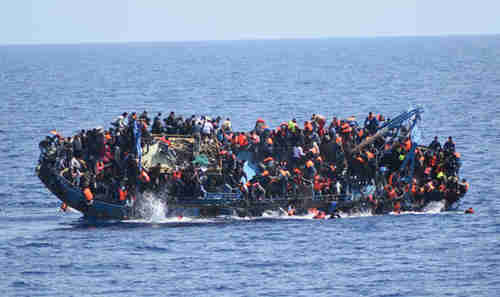 |
Human rights are describing as "catastrophic" the situation that 700-900 migrants drowned in the last week, attempting to cross the Mediterranean Sea from Libya to Italy.
However, some 13,000 to 14,000 were rescued in the last week. These numbers are similar to those from 2015. The numbers are expected to increase over the summer, as there are some 800,000 migrants in Libya waiting to cross. Almost all the migrants are coming from black African countries, including Nigeria, Egypt, Eritrea and Sudan.
Earlier predictions that there would be a flood of refugees from Syria, since the Aegean Sea route has been closed by the EU-Turkey refugee deal, have not been realized so far. The Libya route is many times more dangerous than the Aegean Sea route, and it's possible that many Syrian refugees are waiting to see if the EU-Turkey deal will fall apart, which could very well happen soon. The Local (Italy) and Eagle Online (Nigeria) and Express (London)
Turkey's president Recep Tayyip Erdogan has once again expressed his support for procreation, saying that no Muslim family should ever consider birth control or population planning.
"We will multiply our descendants. They talk about population planning, birth control. No Muslim family can have such an approach. Nobody can interfere in God's work. The first duty here belongs to mothers. ...I am saying this clearly, we will increase our posterity and reproduce generations. As for population planning or birth control, no Muslim family can engage in such a mentality. We will follow the road that my God and dear Prophet [Muhammad] say."
Erdogan has previously been quoted as saying: "One or two children mean bankruptcy. Three children mean we are not improving but not receding either. At least three children are necessary in each family, because our population is at risk of aging." He has previously equated birth control with treason.
Erdogan's remarks were heavily criticized by women's groups for telling women how many children to have and dismissing the Western idea of gender equality. Hurriyet (Ankara) and Gulf Times (Doha)
Ever since I learned, years ago, that Muslims had the greatest birth rate of all religions, then I've been trying to find out why.
According to Pew Research, this trend will continue for decades into the future. According to Pew, from 2010-2050 population size is expected to increase 73% for Muslims, 35% for Christians, 34% for Hindus, and 16% for Jews, with the overall growth rate of 35%.
However, those figures assume that there won't be a new world war. As we described yesterday, the world is already bulging with people, food is becoming more expensive, and refugees are pouring out of Asia, the Mideast and Africa. This becomes more unstable every day, as does global finance, with huge interlocking debts in a giant credit bubble.
However, Muslims have been the fastest growing religion since the end of World War II. Furthermore, when I researched this in the past, I noticed that this applied to Sunni Muslim countries to but not to Iran, a Shia Muslim country. So I reached the obvious conclusion that this phenomenon applies not to Muslims in general, but only to Sunni Muslims.
My theory has always been that after the devastating destruction of Turkey's Ottoman Empire, which had ruled the Muslim world since the 1400s, Sunni Muslims developed either explicit or implicit communal sense that the way to get the Ottoman Empire back was to have as many children as possible.
I've asked any number of Muslims and Muslim scholars whether this theory makes sense, whether there was some kind of fatwa issued by some cleric in the 1920s or 1930s, telling Muslims to have as many children as possible to recover from the destruction of the Ottoman Empire. No one I spoke to supported this theory, and many explicitly denied it, although were also surprised to learn the statistics that Sunni Muslim populations have been the fastest growing populations, something of which they had been unaware.
There is no prohibition against contraception in Islam. Abortion and hysterectomies are prohibited, but ordinary contraceptive methods are acceptable, including the IUD and the pill. In fact, the Catholic religion is far more restrictive about contraception than Islam is. So Erdogan's claims about birth control appear to be exaggerated.
But here we have Turkey's super-authoritarian president Recep Tayyip Erdogan, who gives every sign of wanting to reconstitute the old Ottoman Empire, saying that women should avoid contraception, have as many children as possible, "multiply our descendants."
So I'm sticking to my theory. The reason for the high birth rate among Sunni Muslims after World War II is because of of an explicit or implicit communal sense that the way to get the Ottoman Empire back was to have as many children as possible.
From the point of view of Generational Dynamics, Erdogan's exhortation is just one more crazy idea, of which there are many, from just one more crazy politician, of which there are many. The Mideast is headed for a massive sectarian war, and Turkey will be at war with Iran, Russia and several Western countries, at the very least. As I wrote yesterday, those wonderful children will all be cannon fodder, and archeologists of the future will enjoy digging up their bones from mass graves. Pew Research and Islamic Edicts on Family Planning
(Comments: For reader comments, questions and discussion, see the 31-May-16 World View -- Turkey's president Erdogan tells Muslims not to use birth control thread of the Generational Dynamics forum. Comments may be
posted anonymously.)
(31-May-2016)
Permanent Link
Receive daily World View columns by e-mail
Donate to Generational Dynamics via PayPal
Pacifism and the futility of war
This morning's key headlines from GenerationalDynamics.com
 |
Decoration Day was officially designated on May 5th, 1868, by President Ulysses Grant, to honor and decorate with flowers the graves of fallen soldiers during the Civil War. It was officially proclaimed on by General John Logan, national commander of the Grand Army of the Republic, in his General Order No. 11:
"The 30th of May, 1868, is designated for the purpose of strewing with flowers, or otherwise decorating the graves of comrades who died in defense of their country during the late rebellion, and whose bodies now lie in almost every city, village and hamlet churchyard in the land."
The date of Decoration Day, as he called it, was chosen because it wasn’t the anniversary of any particular battle.
Following World War I, Decoration Day was changed to Memorial Day, to honor Americans who died fighting in any war, not just the Civil War. Memorial Day is different from Veterans Day, which honors living veterans.
In 1971, Congress passed the National Holiday Act of 1971, making Memorial Day the last Monday in May, and a federal holiday, ensuring a three-day weekend. Almost every state now observes the holiday, although some southern states have an additional separate day for honoring the Confederate war dead: January 19th in Texas; April 26th in Alabama, Florida, Georgia, and Mississippi; May 10th in South Carolina; and June 3rd (Jefferson Davis’ birthday) in Louisiana and Tennessee. Washington Post and US Memorial Day and LA Times
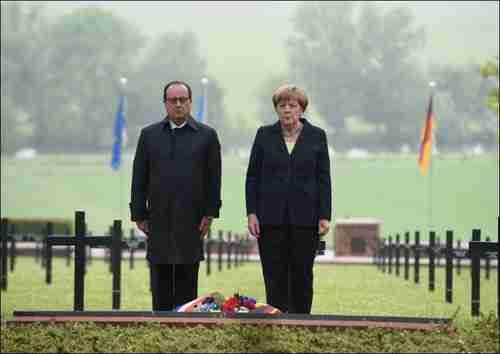 |
Verdun was the longest battle of World War I, a savage confrontation lasting 10 months and leaving 800,000 German and French soldiers dead, wounded or missing. The Germans fired two million shells in the opening eight-hour bombardment, and tens of millions were fired over the course of the conflict.
The Germans initially gained five miles of ground in the battle, but over time the French regained the ground they had lost. Officially, France was the victor, but they had nothing to show for their victory but piles of dead bodies.
On Sunday, German chancellor Angela Merkel and France's president François Hollande led a ceremony in the city of Verdun, to commemorate the battle's 100th anniversary.
Both Merkel and Hollande related the battle to today's migrant and Brexit crises, which are threatening to tear the European Union apart. Merkel said:
"The name Verdun stands for incomprehensible cruelty and the futility of war as well as the lessons learnt and the German-French reconciliation. ...War is possible. We must remain vigilant to avoid it ... All these dead are the victims of nationalism, of stubborn blindness and the failings of politicians."
Hollande warned against "forces of division" in Europe, saying "Disenchantment has given way to bitterness, doubt to suspicion and, for some, rejection or even separation."
The ceremony was held at Douaumont Ossuary, which contains the bones of 130,000 German and French soldiers. BBC and Irish Times
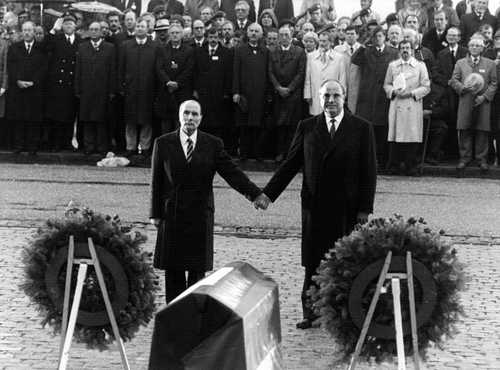 |
Although reconciliation between Germany and France was every European leader's goal after World War II, the bitter war kept them separated. By 1984, the people in the generations of Nazi and French leaders who had fought the war were finally mostly gone, and reconciliation was finally possible.
Above is the highly emotional photo of Helmut Kohl and François Mitterrand standing hand-in-hand during a 1984 commemoration ceremony at Verdun. It's an iconic photo illustrating reconciliation that took place between their respective nations after two world wars.
This was the 68th anniversary of the Battle of Verdun. Kohl and Mitterrand issued a joint statement:
"France and Germany have learnt lessons from our history. Europe is our common fatherland. We are heirs of a grand European tradition. This is why, forty years ago, we ended our fratricidal war and began to build our future together. We were reconciled, we came to an agreement, we became friends. European unification is our common goal – this is what we are working towards – in the spirit of fraternity."
Today in History and International Herald Tribune (29-May-1966)
 |
Many people wear red poppies on Memorial Day, to commemorate the dead. The tradition came about because of the following poem, written by a Canadian soldier fighting in World War I:
In Flanders Fields
By: Lieutenant Colonel John McCrae, MD (1872-1918)
Canadian Army
IN FLANDERS FIELDS the poppies blow
Between the crosses row on row,
That mark our place; and in the sky
The larks, still bravely singing, fly
Scarce heard amid the guns below.
We are the Dead. Short days ago
We lived, felt dawn, saw sunset glow,
Loved and were loved, and now we lie
In Flanders fields.
Take up our quarrel with the foe:
To you from failing hands we throw
The torch; be yours to hold it high.
If ye break faith with us who die
We shall not sleep, though poppies grow
In Flanders fields.
Lieutenant Colonel John McCrae died of pneumonia and meningitis in Boulogne, France, on January 28th, 1918. The poppy is Canada's official Flower of Remembrance. LaMa Arts and Flanders Fields Music
At Sunday's commemoration of the Battle of Verdun, German Chancellor Angela Merkel said, "The name Verdun stands for incomprehensible cruelty and the futility of war."
If any battle illustrates the futility of war, then the Battle of Verdun does. The German attack won five miles of ground which the French recovered in the weeks that followed. What was the point?
In fact, you could ask the same thing about all of World War I and World War II. There have been some small boundary changes in Europe in the last century, but hardly worth hundreds of millions of people killed.
If the futility of war is so obvious, then why are there wars? Why isn't everyone a pacifist?
From the point of view of Generational Dynamics, the answer is simple: The world's population grows faster than the world's food supply. That means that, eventually, some people will have to be exterminated so that there'll be food for the rest. The same reasoning applies to other resources.
A good example is the Mideast. The Israelis and the Palestinians have some of the fastest growing populations in the world. Each year, more and more people are jam-packed into Israel, Gaza and the West Bank. And the Israelis and Palestinians hate each other. (Incidentally, the Palestinians in Gaza and the West Bank hate each other also, to a lesser extent.) All these Israeli and Palestinian children are simply cannon fodder for the next war. People who talk about "two nations, Israel and Palestine, living side by side in peace and harmony" are living in a total fantasy. This region is like a pressure cooker that must some day explode.
If you believe in evolution, then this is easily explainable. The strongest and fastest growing species is the one most likely to survive, because it will get the most food and resources. If there's no food left for the weaker species, then that species will quietly become extinct. That's because animals are not intelligent. Humans are intelligent, so they don't quietly become extinct. They conduct riots, demonstrations, and terrorist attacks, and eventually wars of extermination. So the strongest and fastest growing tribes, societies or nations will win the wars, and get all the food
If you believe in creationism, then the explanation is different, but also easily explainable. God has created a world in which the population grows faster than the food supply, so wars of extermination must occur. If wars of extermination must occur, because of God's creation, then it's God's fault that wars of extermination occur. It hardly makes sense to blame humans for wars of extermination if God has created a world in which wars of extermination are required. So the strongest and fastest growing tribes, societies or nations will win the wars, and get all the food.
So was the Battle of Verdun an example of futility? No, absolutely not. The Battle of Verdun killed off 800,000 people, and the food for those 800,000 people became available to other people. With those 800,000 people dead, they didn't need food, didn't need water, didn't need land, didn't need energy, and so forth. Those resources became available to other people. So the Battle of Verdun did exactly what it had to do, and except for those who experienced personal loss, it improved the lives of millions of other people. And that, Dear Reader, is the way the world works.
The world is bulging with people. Food is becoming more expensive, and refugees are pouring out of Asia, the Mideast and Africa. These are typical characteristics of a generational Crisis era.
Here are five events:
Sooner or later, one of these events (or something like them) will occur, and in this generational Crisis era, that will trigger all the others, and the Clash of Civilizations world war.
(Comments: For reader comments, questions and discussion, see the 30-May-16 World View -- Decoration Day: Commemorating America's heroes and the Battle of Verdun thread of the Generational Dynamics forum. Comments may be
posted anonymously.)
(30-May-2016)
Permanent Link
Receive daily World View columns by e-mail
Donate to Generational Dynamics via PayPal
Economic collapse of Venezuela will devastate the entire Caribbean region
This morning's key headlines from GenerationalDynamics.com
 |
According to a statement by Venezuela's president Nicolás Maduro Moros, his predecessor "[Hugo] Chávez earned a place in heaven" by subsidizing heating oil to 150,000 low-income American families, and especially by the PetroCaribe program, which subsidizes oil for many Caribbean and Central American companies. However, Venezuela's Socialist economy spirals into collapse, all of these subsidy programs are in jeopardy, and ending the programs could seriously destabilize the region, as many countries are already in economic difficulties.
The PetroCaribe program began in 2005, at a time when Venezuela was making huge amounts of money from selling oil. Under the program, a Venezuela lends the country most of the cost of the oil under very lenient terms -- 25 year loans with interest rates as low as 1%. In addition, Venezuela accepts debt payments in kind. For the last 10 years, it has received payments in bananas, rice, jeans, medical assistance and “intelligence” services (from Cuba). Estimates are that this costs Venezuela $2-3 billion per year in lost income. This was not a problem a few years ago, but with the economy collapsing, it is today.
In a recent visit to Jamaica, Maduro insisted that Venezuela is still committed to the PetroCaribe program:
"We are fully convinced that in the last 10 years, PetroCaribe has clearly demonstrated that it’s only together that we can reach development and (achieve) happiness for our peoples."
If Maduro is correct that PetroCaribe is needed to achieve happiness for Latin American peoples, then the logical conclusion is that there will be a lot of unhappiness in Latin America if PetroCaribe ends. That's exactly the conclusion of New York based Latin America analysts LATAM PM.
Venezuela has almost $2 billion in debt due in October, $3 billion in November and almost $4 billion in April 2017, making default almost certain. According to LATAM PM:
Inflation hit 180.9 per cent and the economy contracted 5.7 per cent last year, according to central bank figures. Contagion risks are significant: on one hand, regional risk could spike, with Brazil and Ecuador already in a recession.PetroCaribe ... is also in big danger. Between 2004 and 2008, Venezuela experienced an economic miracle. Its economy grew ten per cent on average every year, while GDP per capita expanded by 26 per cent. Now Venezuela is going backwards.
By 2018, the country will reach the GDP seen in 2005, but with a population six million (20 per cent larger). GDP per capita will fall to 2000 levels by 2018, as if 18 years had never occurred for the economy."
Members of the PetroCaribe program include Antigua and Barbuda, Bahamas, Belize, Cuba, Dominica, Dominican Republic, Grenada, Guyana, Jamaica, Saint Kitts and Nevis, Saint Lucia, Saint Vincent and the Grenadines, Suriname, Haiti, Nicaragua, Honduras and El Salvador. Guatemala left the program in 2013. From the Caribbean, only the oil producers Trinidad and Tobago and Barbados refused Venezuela’s offer.
The inevitable end of the PetroCaribe program will have significant impact on most of these countries. The region spends around 15% of its GDP on oil imports, and many of the countries have a strong dependency on Venezuela's cheap oil. According to LATAM PM, "the existence of PetroCaribe is a matter of time and this will bring economic instability to Central America and the Caribbean." Jamaica Observer and Nation News (Barbados) and LATAM PM (29-Feb) and Economist (4-Oct-2014)
As has been frequently reported, the citizens of Venezuela are suffering one indignity after another, thanks to the approaching collapse of Venezuela's Socialist economy. These indignities include jailing of factory owners, and severe shortages of everything from toilet paper to beer. ( "15-May-16 World View -- Venezuela economy close to collapse as Maduro orders jailing of factory owners")
On Saturday, the German airline Lufthansa announced that it is suspending all flights to Venezuela as of June 18. The reason is that many airline fares are paid in Venezuela's bolivar currency, which has become practically worthless, with the highest inflation rate in the world. Reuters
I was startled to hear analyst Yolanda Valery on the BBC describe the unfolding some of the history of the tenure of Hugo Chávez, as he worked to create his Socialist paradise.
In the mid-2000s decade, Venezuela was swimming in money. Starting in 2006-7, Chávez put a plan into action to turn Venezuela into a pure Socialist state. The plan was as follows:
Nobody would think of awarding Chávez or any of his acolytes (Sean Penn, Michael Moore, Oliver Stone, Jeremy Corbyn) any prizes for anything but sheer stupidity, but this plan is about the dumbest thing I've ever seen.
This reminds me of Mao Zedong's plan to create a Socialist Paradise in China -- the Great Leap Forward of 1958-59.
500,000,000 peasants were taken out of their individual homes and put into communes, creating a massive human work force. The workers were organized along military lines of companies, battalions, and brigades. Each person's activities were rigidly supervised. Mao's stipulated purpose was to mobilize the entire population to transform China into a socialist powerhouse -- producing both food and industrial goods -- much faster than might otherwise be possible. This would be both a national triumph and an ideological triumph, proving to the world that socialism could triumph over capitalism.
The Great Leap Forward was a disastrous failure, and tens of millions of people died of starvation. BBC: Venezuela on the Brink (MP3 at 17:30)
(Comments: For reader comments, questions and discussion, see the 29-May-16 World View -- Hugo Chávez dismantled Venezuela's businesses on purpose to create Socialist Paradise thread of the Generational Dynamics forum. Comments may be
posted anonymously.)
(29-May-2016)
Permanent Link
Receive daily World View columns by e-mail
Donate to Generational Dynamics via PayPal
Iran and Hezbollah turn focus of hostility from Israel to Saudi Arabia
This morning's key headlines from GenerationalDynamics.com
 |
As I've been writing for years, Generational Dynamics predicts that Iran, India and Russia will be allied with the West against China, Pakistan, and the Sunni Arab nations in the coming Clash of Civilizations world war.
For the last few weeks, there have been increasingly widespread reports in the media that Israel and Saudi Arabia have all but severed ties with the United States, and are forming an independent military alliance against Iran.
This development runs counter to a very powerful Generational Dynamics trend prediction, and so it needs to be analyzed. Either the trend prediction is wrong (which it isn't), or the Israel-Saudi alliance must be relatively short-lived.
Several days ago, Israel's prime minister Benjamin Netanyahu publicly announced a significant change in policy, as he asked the Arab nations to help in a "real deal" with the Palestinians:
"The initiatives I’m referring to are regional initiatives – meaning, aided by the Arab countries in the region to reach a real deal with the Palestinians. We always thought it would be the opposite, but that is the direction today. I am constantly trying, including over the last few hours, to further contacts with various leaders in the region to help in this direction."
A couple of days previously, Netanyahu responded to an offer by Egypt's president Abdel Fattah al-Sisi to mediate between Israel and the Palestinians by saying, "Israel is ready to participate with Egypt and other Arab states in advancing both the diplomatic process and stability in the region. I appreciate President al-Sisi’s work and also draw encouragement from his leadership on this important issue." According to reports, the Arab countries include Saudi Arabia, the Gulf states, Jordan and Egypt.
Netanyahu had previously rejected the help of Arab mediators in the Palestinian issue, because they were insisting on the "right of return," which would allow the descendants of Palestinians lost their homes in the 1948 war between Jews and Arabs to reclaim their grandparents' real estate. However, reports suggest that the Arab nations are backing off from that demand.
The Palestinian issue is only the latest of the issues uniting the Saudis, Egyptians and Israelis. As we've reported for years, President Obama has managed to alienate all three countries and offended their leaders. This has led to a shared sense of betrayal and abandonment, especially after Obama's vigorous pursuit of a nuclear deal with Iran, creating a widespread impression that he was more interested in a good relationship with Iran than with them.
There have been signs that the rapprochement in Israel's relationship with Egypt and Saudi Arabia has crossed over into the military sphere.
Israel and Egypt signed a 1979 peace treaty that Egypt's Sinai peninsula was a demilitarized zone. Yet Israel has approved Egypt's requests to move additional troops into Sinai, near the border with Israel. More recently, Israel raised no objections to Egypt's transferring two Red Sea islands to Saudi Arabia, even though the transfer affected Israel's security.
Israel and Saudi Arabia share the common interest and belief that the biggest threat is Iran. Reports have surfaced in the past that the Saudis gave Jerusalem approval for Air Force jets to pass through their airspace if Israel decides to attack Iran's nuclear facilities. This suggests that Israel and Saudi Arabia have military to military contacts regarding Iran, and may be sharing intelligence or making other plans. Breaking Israel News and Israel National News and Politico (EU) and Jerusalem Post (12-Apr)
According to recent reports, Iran has ordered Hezbollah to suspend operations against Israel and to target Saudi Arabia instead.
Lebanon's Shia terrorist group Hezbollah and its leader Sayyed Hassan Nasrallah have been Iran's puppets for decades, and have had as their main objective "resistance" to Israel, or the destruction of Israel. Israel and Hezbollah fought a war in Lebanon in 2006, and Hezbollah has supported Hamas and other Palestinian groups in conducting terror operations against Israel and Israeli targets.
But the war in Syria has changed all that. Under orders from Iran, Hezbollah sent thousands of its fighters into Syria to fight alongside the army of the regime of Syria's president Bashar al-Assad. The targets have been anyone who opposes al-Assad, all the way from peaceful protesters and children in school all the way to the jihadist groups, so-called Islamic State (IS or ISIS or ISIL or Daesh) and the al-Qaeda linked Jabhat al-Nusra (al-Nusra Front).
Last week, Nasrallah admitted for the first time that he had lost "a large number" of his fighters in battles in Syria. Some reports give a figure of 1,500 to 2,000, or one-third of his entire army.
The new orders from Iran were triggered by a number of devastating Iranian and Hezbollah losses in Syria, including the assassination of Hezbollah's top military commander Mustafa Amine Badreddine, who was leading Hezbollah forces in Syria. ( "14-May-16 World View -- Syria's Aleppo campaign falters after disastrous Iranian loss at Khan Tuman")
The death of Badreddine was extremely significant, and statements by Iran and Hezbollah make it clear that they blame his death on jihadist forces funded and supported by Saudi Arabia.
As we reported yesterday, Iran has announced that it would not let its citizens participate in the Hajj in Mecca on September 9-14. This is Islam's holiest event, and non-participation by Iran is quite significant. ( "27-May-16 World View -- Increasingly hostile Iran-Saudi relations affect this year's Hajj")
According to reports, Iran has instructed Hezbollah to initiate actions against Saudi Arabia before the beginning of the Hajj in September. Middle East Eye (17-May) and Middle East Eye and Reuters (20-May) and Al Arabiya (20-May)
I am asked frequently it's conceivably even POSSIBLE that Iran will be an American ally in the coming world war, as I've been predicting for ten years would happen, given the political situation of the last ten years.
There are examples in World War II that serve as precedents. Russia and Josef Stalin were our bitter enemies before the war, but we were allies during the war. Britain and Nazi Germany were close before the war, but were bitter enemies during the war. Before the war, Germany and Russia signed a non-aggression pact, called the Molotov-Ribbentrop Treaty, but Germany invaded Russia anyway.
A generational crisis war, like World War II, is very different from an "ordinary" war because it's considered existential, a threat to the very existence of a country and its way of life. None of the wars that America experience since the end of WW II -- Korean war, Vietnam war, Iraq wars -- was anything like that. Non-crisis wars are based on political decisions. You have Christmas truces in non-crisis wars. Crisis wars are based visceral hatred, a desire to exterminate. There are no Christmas truces.
So right now, Saudi Arabia and Israel are allied against Iran. But this is a purely political alliance. There is no visceral hatred among Israelis for Iranians, and there is no visceral hatred among Iranians for Israelis. (See, for example, "9-Nov-15 World View -- Political crisis in Iran grows over nuclear agreement")
On the other hand, the relationship between Saudi Arabia and Iran is based on deeply visceral hatred. We see signs of this all the time, such as the Iranian firebombing of the Saudi embassy in Tehran in January, with no apology forthcoming. Iran and Saudi Arabia will be involved in an extremely bloody generational crisis war with absolute certainty, and it appears that the time is approaching rapidly.
So what about Israel? There is little hatred between Israelis and Iranians, but there's enormous hatred between Israelis and Palestinians, particularly among younger generations. The prediction that I first posted in May 2003 is still just as true today as it was then: Jews and Arabs are headed for a new generational crisis war, re-fighting the 1948-49 genocidal war between Jews and Arabs that followed the partitioning of Palestine and the creation of the state of Israel. (From 2003: "Mideast Roadmap - Will it bring peace?")
OK, so what about Egypt? Israel and Egypt have had a peace treaty for over a quarter century. Will Israel be at war with Egypt?
To address that question, one first has to point out that Egypt is at war with itself. Egypt's army is fighting ISIS and Bedouins in Sinai, and there have been major riots targeting Coptic Christians in Egypt.
This example is a small illustration of a vastly larger problem in analyzing generational trends in the Mideast -- that there are ethnic fault lines that go beyond the easily predicted sectarian fault lines. Especially with the rise of ISIS, al-Nusra and the Kurds, we can already see signs of Sunnis fighting Sunnis in Syria, for example.
What's needed is a deep, thorough analysis of the trends among all the ethnic groups in the Mideast. Remarkably, this would be a lot easier today than it was even ten years ago, because today there's a huge wealth of social media that can be looked at.
Analyzing that huge volume of social media is far more work than I'm capable of accomplishing. But if some college student is looking for a thesis topic in order to accomplish something really important and develop valuable information on the future of the Mideast, then this is it. Der Spiegel (13-Jun-2013) and World War II: The Molotov-Ribbentrop Pact
(Comments: For reader comments, questions and discussion, see the 28-May-16 World View -- Report: Israel and Saudi Arabia are allying against Iran and Hezbollah thread of the Generational Dynamics forum. Comments may be
posted anonymously.)
(28-May-2016)
Permanent Link
Receive daily World View columns by e-mail
Donate to Generational Dynamics via PayPal
Far-left anti-government riots spread across France
This morning's key headlines from GenerationalDynamics.com
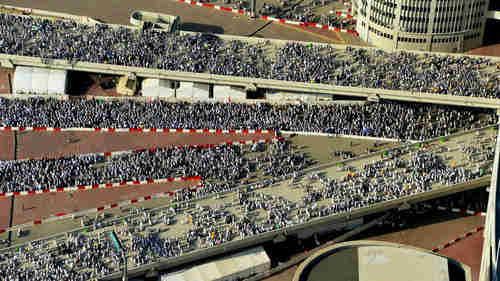 |
Sectarian Sunni versus Shia relations in the Mideast have worsened significantly in the last year, largely driven by Iran's support of the Syria's genocidal Alawite president Bashar al-Assad, who for five years has been conducting a war of extermination against his own Sunni citizens.
The Hajj takes place each year in Mecca, in Saudi Arabia. It's Islam's holiest event, commemorating rituals that date back to the prophet Abraham, and then codified by the prophet Mohamed in the Quran. Each Muslim is required to make a pilgrimage to the Hajj at least once in his lifetime. Last year, about two million Muslims from 180 countries around the world arrived in Saudi Arabia for their once in a lifetime Hajj pilgrimage. This year, the dates of the Hajj are September 9-14.
The worst disaster to befall the Hajj in modern times occurred last year when two large groups of pilgrims arrived together at a crossroads in Mina, a few kilometers outside the holy city of Mecca. Hundreds of thousands of pilgrims were walking towards the site of one of the most important rituals, "stoning the devil," which requires throwing seven stones at a pillar representing Satan in the city of Mina. However, when two massive crowds converged on the same narrow street, the people in front were forced to stop, while the ones hundreds of meters to the rear kept on walking. All of this took place under a burning hot sun, with a temperature of 46 degrees centigrade (= 114 degrees fahrenheit). The result was that hundreds of pilgrims suffocated or were trampled to death, including many elderly people and children. ( "27-Sep-15 World View -- After Hajj stampede disaster, Muslims debate the 'Will of Allah'")
The stampede caused the death of at least 769 pilgrims, of which 464 were Iranians, according to the Saudis. There have been claims that up to 2,200 pilgrims were killed in the stampede. From the beginning, Iran called the stampede "a crime," and demanded that the Saudis be prosecuted in international courts. The Saudis said that the stampede was cause by Iranian pilgrims "not following instructions."
Relations between Saudi Arabia and Iran took a major step towards increased hostility in January of this year, when Saudi Arabia executed 47 alleged terrorists -- 46 Sunnis and one Shia, Mohammad Baqir Nimr al-Nimr, infuriating Iran and Shias because it implied that Shia terrorism is equivalent to Sunni terrorism. Iranian mobs firebombed the Saudi embassy in Tehran, and attacked the consulate in Meshaad. ( "18-Jan-16 World View -- Pakistan tries to mediate between Saudi Arabia and Iran")
After the firebombing of the Saudi embassy in Tehran, Saudi Arabia and Iran broke diplomatic relations. Other Saudi allies followed suit. In January, the Saudis halted trade and airline flights with Iran.
Then, at the beginning of April, the Saudis banned Iran's airline, Mahan Air, from flying through Saudi airspace at all, or landing at its airports, saying that Mahan was in violation of safety regulations. This affected around 150 direct flights per month between Iran and Saudi Arabia. The National (UAE, 5-Apr) and Al Bawaba (Palestine, 6-Apr) and Press TV (Tehran, 5-Apr)
With the 2016 Hajj approaching, Saudi Arabia and Iran have made the Hajj an issue in the severe hostility existing between the two countries. The issues are as follows:
Since the beginning of May, the Iranians and Saudis have been in talks, attempting to find a way to resolve this issue. However, the two countries are still at an impasse, and an Iranian official said Iran was "very concerned over the security of Iranians during the holy ceremony." Al Arabiya (12-May) and Al Jazeera and Leadership (Nigeria) and Al Monitor
Hundreds of thousands of people took to the streets across France on Thursday to protest the government's proposed labor reform bill. In Paris, protests descended into violence, with protesters throwing projectiles and police firing bouts of teargas. Across the country, rioters blockaded roads and oil refineries, resulting in a shortage of petrol.
France has the shortest legal working week in Europe, at 35 hours. The 35 hour work week would be kept, but the new law would make it easier for employers to lay people off. Layoffs are currently almost impossible in France, but the reforms would allow companies whose revenues have fallen for four consecutive quarters to lay people off.
France has a 10.5% unemployment rate, compared with 5.4% in the UK and 4.8% in Germany. Most observers blame France's high unemployment rate on the fact that employers are reluctant to hire anyone, especially young people, since it's almost impossible to fire them if they're incompetent.
According to reports, the far-left activists calling for the strikes and riots feel betrayed because the labor reforms are being proposed by France's Socialist president François Hollande who, they feel, should completely support the far left.
As I wrote a few days ago, we're seeing in many countries complete rejection of established politicians by young Millennials, and deep polarization as large segments of the population move to the far left, while other segments move to far right. This is what happened in the 1930s, leading to World War II, and we can expect to see more riots and demonstrations on the far right and the far left, as these countries go deeper into a generational Crisis era. France 24 and BBC
(Comments: For reader comments, questions and discussion, see the 27-May-16 World View -- Increasingly hostile Iran-Saudi relations affect this year's Hajj thread of the Generational Dynamics forum. Comments may be
posted anonymously.)
(27-May-2016)
Permanent Link
Receive daily World View columns by e-mail
Donate to Generational Dynamics via PayPal
IMF balks at new European bailout plan for Greece
This morning's key headlines from GenerationalDynamics.com
 |
Just four days after Taiwan's new president Tsai Ing-wen took office, she is already facing a major political crisis with China, after a major election victory in January. ( "17-Jan-16 World View -- Taiwan's pro-independence party wins historic presidential election")
As I wrote in my January article, Taiwan-China relations are sure to be tumultuous as soon as Tsai takes office, and that is happening very quickly.
Since 2008, Taiwan has been governed by the pro-China Kuomintang (KMT) party, which favors the "one China" principle and unification with mainland China, and which has fully supported all of China's claims in the South China Sea.
Tsai is the leader of Taiwan's Democratic Progressive Party (DPP), which in the past has favored Taiwan independence from China. When the DPP was in power prior to 2008, relations between China and Taiwan so bad that in 2005 Beijing passed an "anti-secession law" saying that China would take military action against Taiwan if there were any moves or speeches in the direction of Taiwan independence from China.
So in Tsai's inauguration speech five days ago, Tsai said that she "respected" the "common understanding" between Taiwan and China, but did not say what the common understanding was.
According to Beijing state media, Tsai made "a painful effort not to answer one important question..., whether or not to acknowledge the 1992 Consensus embodying the one China principle."
According to Beijing:
"The current developments across the Taiwan Straits are becoming complex and grave. ...Since 2008, the two sides of the Straits, acting on the common political foundation of adhering to the 1992 Consensus and opposing "Taiwan independence", have embarked on the path of peaceful growth of cross-Straits relations. ...
The key to ensuring peaceful growth of cross-Straits relations lies in adhering to the 1992 Consensus, which constitutes the political basis of cross-Straits relations. The 1992 Consensus explicitly sets out the fundamental nature of relations across the Taiwan Straits. It states that both the Mainland and Taiwan belong to one and the same China and that cross-Straits relations are not state-to-state relations. The 1992 Consensus was reached with explicit authorization of the two sides and has been affirmed by leaders of both sides. It thus constitutes the cornerstone of peaceful growth of cross-Straits relations.
We have noted that in her address today, the new leader of the Taiwan authorities stated that the 1992 talks ... reached some common understanding, and that she will handle affairs of cross-Straits relations in keeping with the existing defining document and related regulations and continue to advance the peaceful and stable growth of cross-Straits relations on the basis of the established political foundation.
However, she was ambiguous about the fundamental issue, the nature of cross-Straits relations, an issue that is of utmost concern to people on both sides of the Taiwan Straits. She did not explicitly recognize the 1992 Consensus and its core implications, and made no concrete proposal for ensuring the peaceful and stable growth of cross-Straits relations. Hence, this is an incomplete test answer.
A choice of different path leads to different future. This is a choice between upholding the common political foundation that embodies the one China principle and pursuing separatist propositions of "Taiwan independence" such as "two Chinas" or "one country on each side". This is a choice between staying on the path of peaceful growth of cross-Straits relations and repeating the past practice of provoking cross-Straits tension and instability. And this is a choice between enhancing the affinity and well-being of people on both sides and severing their blood ties and undermining their fundamental interests. The Taiwan authorities must give explicit answer with concrete actions to all these major questions and face the test of history and the people. ...
"Taiwan independence" remains the biggest menace to peace across the Taiwan Straits and the peaceful growth of cross-Straits relations. Pursuing "Taiwan independence" can in no way bring peace and stability across the Taiwan Straits. The common will of people on both sides of the Straits are not to be defied. Today, we remain as determined as ever to uphold national sovereignty and territorial integrity and have ever stronger ability to do so. We will resolutely forestall any separatist moves and plots to pursue "Taiwan independence" in any form."
Beijing is demanding that "Taiwan must clarify this issue with practical action and allow the examination of the people and history."
Tsai won the January election overwhelmingly because the people of Taiwan, especially the younger generations, increasingly identify as "Taiwanese" rather than "Chinese." The KMT is a party of older generations.
If Tsai complied with China's demands and unambiguously recognized the 1992 Consensus, there would probably be anti-Chinese "Sunflower movement" riots in the streets, as there were frequently the last time the DPP was in power, and those riots will probably overflow into Hong Kong, where there could be a renewal of anti-Chinese "Umbrella movement" riots.
So China's demands of Tsai are quite ominous, and the political situation will be extremely volatile no matter what Tsai decides to do. China Radio International's English Service and Xinhua
The eurozone finance ministers, meeting in Brussels, announced on Wednesday morning that they had reached deal to provide a new bailout to Greece, and also announced that the deal complies with the demands by the International Monetary Fund (IMF) for "debt relief" for Greece, and that debt relief will be provided by 2018. The new 10.3 billion euro bailout loan to Greece would allow Greece to make a July 1 debt repayment and avoid bankruptcy. It's expected that, as in the past, about one-third of the bailout loan would come from the IMF, which is funded by the United States and other countries, and two-thirds would come from eurozone institutions.
The IMF demand for "debt relief" alludes to the fact that Greece can never pay off its debt. Readers who have been following this issue for years and years can well remember crisis after crisis, with a decision each time to "kick the can down the road" by granting Greece a new bailout loan so that they could use it to avoid immediate bankruptcy. (This technique is sometimes called "Using your Visa credit card to pay your Master Card bill.")
However, the IMF announced that for this, the first 2016 crisis, they would not simply kick the can down the road, but would demand debt relief. Since most of Greece's 300 billion euro debt is owed to European Union (eurozone) institutions, the eurozone has it within its power to reduce Greece's debt so that Greece could one day be debt-free.
The main opponent of debt relief has always been the Germans, especially Germany's cranky finance minister Wolfgang Schäuble. So the finance ministers reached a compromise on the debt relief issue, "extending the repayment period and capping interest rates."
What does that mean? Details were not provided, but speculation was that interest rates would be close to zero until 2050, and Greece would not have to repay the debt in full until 2100. By that time Wolfgang Schäuble would be dead, and indeed so would all the other finance ministers.
So the finance ministers announced that they'd agreed on debt relief, and had met the IMF's demands.
However, an IMF official disagreed, saying:
"Greece is in a situation where it needs a disbursement, and so we were certainly willing to concede on some points. But we have not conceded on the point that we need adequate assurances regarding debt relief before we go to our board... I am hopeful we will get there. ...We are not in the situation where the IMF can say that we're ready to move ahead. But... given what we have got from the Europeans, given what they committed to, I'm hopeful that we can get to that point by the end of the year."
By the end of the year? It looks like another crisis in the making. Kathimerini and BBC and AFP
(Comments: For reader comments, questions and discussion, see the 26-May-16 World View -- China demands new Taiwan leader explicitly affirm that Taiwan is part of China thread of the Generational Dynamics forum. Comments may be
posted anonymously.)
(26-May-2016)
Permanent Link
Receive daily World View columns by e-mail
Donate to Generational Dynamics via PayPal
Iran, India and the classic fables of Kalileh-wa-Dimneh, Jataka and Panchatantra
This morning's key headlines from GenerationalDynamics.com
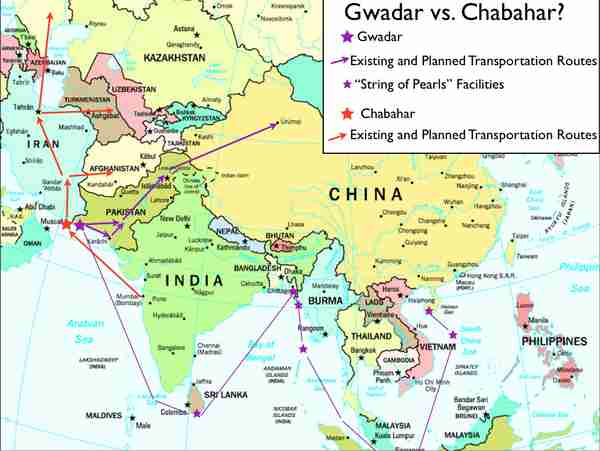 |
In a two-day visit to Iran's capital city Tehran, India's prime minister Narendra Modi and Iran's president Hassan Rouhani signed a dozen commercial, security and cultural agreements.
The most important was the "historic" Chabahar Port agreement. Chabahar is on the coast of Iran near Pakistan. India has agreed to invest $500 million to significantly increase the size of this port. Using it, India will be able to bypass Pakistan in shipping goods to Iran, and from there to Afghanistan, Central Asia or Europe. (Chabahar is the large red star on the map above, and the red lines are proposed travel routes from Mumbai to Chabahar, through Iran to Central Asia and Europe.)
The proposal fo build up the Chabahar has been discussed since the 1990s, but agreements have been slow to come. Then the whole project was put on hold because of international sanctions on Tehran. So this deal comes just four months after international sanctions have been lifted.
China has been investing heavily in the Pakistan's port at Gwadar, shown by the large purple star in the map above. The purple lines show China's trade routes to the Mideast:
A visitor from Mars might wonder why India doesn't just ship commercial goods over land through Pakistan to the port of Gwadar or to Iran. The answer is that in December of last year, Pakistan's government said that it would not permit Indian goods to be transported across Pakistan.
Afghanistan's president Ashraf Ghani was also in Tehran on Tuesday to join in the announcement of the Chabahar Port agreement. The agreement is significant for Afghanistan, because it will mean a great deal of increased trade with its ally, India. Indian Express and Tehran Times and Dawn (Pakistan - 10-Dec-2015)
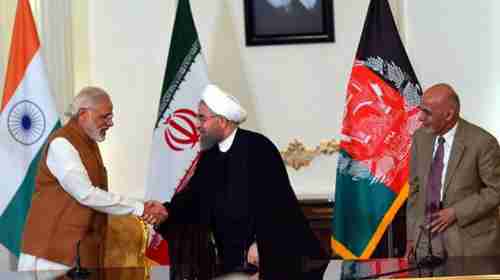 |
Long-time readers are aware that for ten years I've been reporting that Generational Dynamics predicts that in the coming Clash of Civilizations world war, America will be allied with India, Russia and Iran, versus China, Pakistan and the Sunni Muslim countries. ( "15-Jul-15 World View -- Arab views of Iran nuclear deal")
In the case of Iran, the generational analysis was pretty straightforward. In the early 2000s, there were numerous pro-Western and pro-American riots and demonstrations by college students in Iran. Of course, the Iranian hardliners crushed them violently, but doing that didn't change any hearts and minds. Today, those college students are in the 30s, in positions of power, and they retain those pro-Western views. ( "9-Nov-15 World View -- Political crisis in Iran grows over nuclear agreement")
Obviously, that analysis only goes back about 15 years. But in fact, Hindus and Shias have been closely linked for many centuries, and it's particularly significant that in 681 AD Hindus fought on the side of (what would become) the Shias in the most important battle in Islam's post-Mohammed history -- the Battle of Karbala, the battle that permanently split the Muslim world of the time into the Sunni and Shia branches.
During the visit by India's prime minister Narendra Modi to Tehran, Modi gave a speech that emphasized the long relationship between the two cultures:
"Centuries of free exchange of ideas and traditions, poets and craftsmen, art and architecture, culture and commerce have enriched both our civilizations. Our heritage has also been a source of strength and economic growth for our nations. The richness of Persian heritage is an integral part of the fabric of the Indian society. A part of Iranian culture lives in Indian hearts. And, a slice of Indian heritage is woven into the Iranian society. Our ancient heroes and epics bear striking parallels. The dargahs of Azmer Sharif and Hazrat Nizamuddin in India are equally revered in Iran. Mahabharata and Shahnama, Bhima and Rustam, Arjuna and Arsh exhibit similarity in our world views and values. ...As two ancient civilizations, we are known for our ability to be inclusive and welcoming to foreign cultures. Our contacts have not just refined our own cultures. They have also contributed to the growth of moderate and tolerant societies globally. Sufism a rich product of our ancient links, carried its message of true love, tolerance and acceptance to the entire mankind. The spirit of Sufism is also reflected in the Indian concept of ‘Vasudhaiva Kutumbakam’, the World as one family. ...
India and Iran have always been partners and friends. Our historical ties may have seen their share of ups and downs. But, throughout our partnership has remained a source of boundless strength for both of us. Time has come for us to regain the past glory of traditional ties and links. Time has come for us to march together. In this endeavor, you, the eminent scholars have a defining role to play."
After reading that, compare it to the words of China's president Xi Jinping when he visited Pakistan in April of last year to sign numerous commercial, security and cultural agreements, including plans for a $46 billion transportation corridor from Xinjiang province to the port of Gwadar. ( "27-Apr-15 World View -- China extends its military buildup with Pakistan")
During Xi's "historic" visit to Pakistan, he said the following:
"This will be my first trip to Pakistan, but I feel as if I am going to visit the home of my own brother. Over the years, thanks to the nurturing of generations of leaders and people from all sectors of both countries, China-Pakistan friendship has flourished like a tree growing tall and strong. No matter how the circumstances in our two countries, the region and the world change, our bilateral relations have enjoyed sound and steady growth. We have always respected, understood and supported each other on issues concerning our respective core interests. In Pakistan, our relationship is poetically hailed as a friendship “higher than mountains, deeper than oceans and sweeter than honey.” In China, Pakistan is known as a sincere and reliable friend. Obviously, China-Pakistan friendship is deeply felt in the hearts of our two peoples."
In May 2011, Pakistan's ambassador to China Masood Khan described the relationship between Pakistan and China as "higher than mountains, deeper than oceans, stronger than steel, sweeter than honey, and dearer than eyesight."
These two displays of deep affection, India with Iran and China with Pakistan, may sound like true love, but they're the portent of things to come, the coming Clash of Civilizations world war will pit India, Iran and others versus China, Pakistan and others, in the bloodiest and most destructive war in world history. Narendri Modi and Times of India and Pakistan Observer
During Narendra Modi's speech, excerpted above, Modi said the following:
"India and Iran are two civilizations that celebrate the meeting of our great cultures. The rare Persian manuscript Kalileh-wa-Dimneh, released just now, captures the close historical links between India and Iran. It is remarkable how the simple stories of the Indian classics of Jataka and Panchatantra became the Persian Kalileh-wa-Dimneh. It is a classic example of exchange and travel of cultural ideas between two societies. A beautiful demonstration of how our two cultures and countries think alike. A true depiction of the wisdom of our ancient civilizations."
I had never heard of these classics, but I checked out the Kalileh-wa-Dimneh. I've only had time to skim through it, but it's a fascinating collection of fables and stories that remind me of Aesop's Fables. It would be well worth your time, Dear Reader, to take a look for yourself. Kalileh-wa-Dimneh
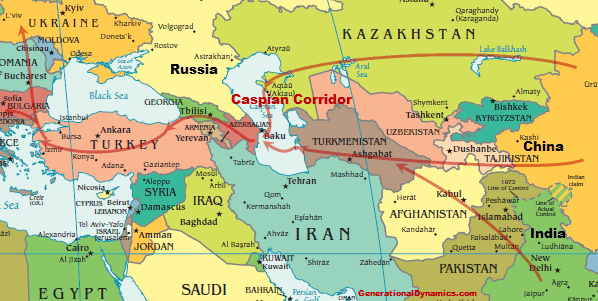 |
In ancient times the Silk Road, a complex road network, was the most favored transport route between China and Europe. Today, there's a great deal of renewed interest in developing a New Silk Road, new trade routes between Asia and Europe. This article describes two such trade routes, through the ports of Chabahar and Gwadar, respectively.
It's worth mentioning one additional trade route from Asia to Europe, the Caspian Corridor, that I've written about before. ( "21-Jan-16 World View -- Azerbaijan forced to choose between Russia and Turkey")
The plan is to develop infrastructure within the Caspian Sea to effectively connect Central Asia to the Caucasus region. Goods can travel overland from India and China through Central Asia by truck and railway, to a port on the Caspian Sea. From there, the goods are ferried across the Caspian Sea to a port in Azerbaijan. From there, they can travel overland again, through Georgia, Turkey, and then into Europe, including Ukraine.
The Caspian Corridor is suitable for Pakistan and China, but not for India, since it would require land transport across Pakistan, which apparently has been forbidden. In fact, Pakistan and China have effectively isolated India from Afghanistan and Central Asia. India has been forced to use costly and impractical routes to reach the heart of Asia and Asiatic Russia.
For that reason, the Chabahar port project is considered a "game changer," and will make a significant difference for India and Afghanistan. According to Afghanistan's president Ashraf Ghani: "A hundred years from now historians will remember this day as the start of regional cooperation. We wanted to prove that geography is not our destiny. With our will we can change geography." Deccan Chronicle (India)
(Comments: For reader comments, questions and discussion, see the 25-May-16 World View -- Iran-India sign 'historic' Chabahar port deal to counter Pakistan-China thread of the Generational Dynamics forum. Comments may be
posted anonymously.)
(25-May-2016)
Permanent Link
Receive daily World View columns by e-mail
Donate to Generational Dynamics via PayPal
Death of Afghan Taliban leader complicates America's relationship with Pakistan
This morning's key headlines from GenerationalDynamics.com
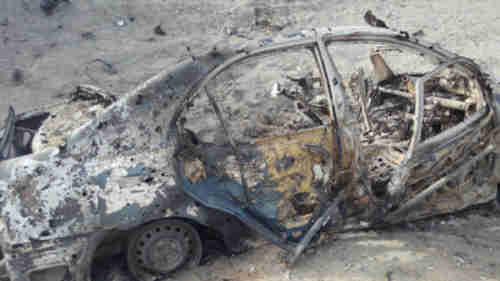 |
The Taliban has confirmed that the American drone strike that "likely" killed Taliban leader Mullah Akhtar Mansour, as we reported two days ago, actually did kill Mansour. The drone strike occurred in Pakistan's Balochistan province.
President Obama bragged that the killing was "an important milestone" for peace in Afghanistan. Secretary of State John Kerry said, "This action sends a clear message to the world that we will continue to stand with our Afghan partners as they work to build a more stable, united, secure and prosperous Afghanistan. Peace is what we want. Mansour was a threat to that effort."
These Pollyannaish views are not supported by any of the analysts I've seen. The Taliban will undoubtedly go through a period of confusion as a new leader is picked, but the wish that the new leader will bring about peace in Afghanistan is fantasy. In fact, the disorganization within the Taliban could allow the so-called Islamic State (IS or ISIS or ISIL or Daesh) to gain a stronger foothold in Afghanistan.
Many consider the most likely choice for Mansour's successor to be Sirajuddin Haqqani, leader of the Haqqani Network, which has worked closely with the Afghan Taliban. Haqqani has a $5 million U.S. bounty on his head, and is widely seen by U.S. and Afghan officials as the most dangerous warlord in the Taliban insurgency, responsible for the most bloody attacks, including one last month in Kabul in which 64 people were killed. Thanks to the help of the Haqqani network, the Taliban now control more territory in Afghanistan today than they did since 2001. Haqqani could take control of the entire Taliban movement if he's approved.
The US drone strike into Pakistan's Balochistan province that resulted in Mansour's death is causing analysts to focus on America's relationship with Pakistan. The US has conducted numerous drone strikes into Pakistan's tribal area. Pakistan's government publicly condemns all American drone strikes as violating Pakistan's sovereign territory, but it's widely believed that Pakistan's Inter-Services Intelligence (ISI) agency covertly approves of the strikes, and even provides the CIA with intelligence for identifying targets.
However, the strike into Balochistan province would be the first known drone strike outside of the tribal area, and is liable to raise hackles in Pakistan similar to those that were raised when American special forces entered Pakistan and killed Osama bin Laden.
The ISI has apparently never approved any drone strikes against Haqqani network targets in Pakistan, and it's suspected that the ISI likes and supports Sirajuddin Haqqani. This has given rise to the speculation that the ISI somehow got the US to kill Mansour so that Haqqani could take over the Taliban. If that speculation is true, then Mansour's death could lead to an even greater insurgency in Afghanistan, and would substantially complicate America's relationship with Pakistan.
Afghanistan's last generational crisis war was the extremely bloody civil war fought between 1991 and 1996. The war was fought mainly between the Pashtuns in southern Afghanistan versus the Northern Alliance of Tajiks, Hazaras and Uzbeks in northern Afghanistan. Today's Taliban terrorists are radicalized Pashtuns, and Generational Dynamics predicts that they are not going to agree to any peace deal, no matter whom they select as their new leader.
President Obama came into office promising to reverse the evil policies of past presidents that led us into war, and promised to bring peace to America. He won a Nobel Peace Prize. But in the last week, President Obama has just won another honor: President Barack Obama officially became the U.S. president to have been at war the longest — longer than Lyndon Johnson, longer than Abraham Lincoln and certainly longer than George W. Bush. This is what happens when America's leader has no clue what's going on in the world. With wars going on in Afghanistan, Iraq and Syria, Obama is virtually certain to be the only U.S. president to spend a full eight years presiding over wars. Deutsche Welle and Reuters and AFP and The Diplomat
A series of coordinated terrorist attacks on Monday in cities near Syria's Mediterranean coast have killed nearly 150 people. There were seven nearly simultaneous explosions in two seaside cities, Jableh and Tartus. A series of car bombs and suicide bombers targeted bus stations, hospitals and other sites.
The obvious objective of the bombings was to kill as many civilians as possible. However, the Russians may also have been targets, as Russia has a naval base near Tartus and an airbase near Jableh.
The so-called Islamic State (IS or ISIS or ISIL or Daesh) claimed responsibility for the attacks. Some analysts considered that unlikely, pointing out that ISIS has been operating mostly in eastern Syria, and had not previously operated in western Syria. However, no one else has claimed credit, and there are some 700,000 refugees from Aleppo, Idlib, Raqqa and other war zones who have fled to the region, and an ISIS cell could well have been among them.
The attacks are a major embarrassment to the regime of Syria's president Bashar al-Assad, for several reasons.
The Syrian regime has been scrambling to explain the massive attacks. Prime Minister Wael al-Halaqi blamed the terrorist attacks on Qatar, Saudi Arabia and Turkey, which is not widely believed outside of Damascus. He said that the "cowardly terrorist actions" would not destabilize the country.
I'm sorry, Dear Reader, but the al-Assad regime uses mortars on innocent protesters, uses Sarin gas on innocent citizens, uses missiles on children's dormitories, and uses barrel bombs on hospitals, so for the regime to refer to someone else's terrorist attacks as "cowardly" is really laughable. AFP and AP and SANA (Damascus) and Syria Online (Damascus)
(Comments: For reader comments, questions and discussion, see the 24-May-16 World View -- Massive explosions in Syria target Bashar al-Assad's heartland thread of the Generational Dynamics forum. Comments may be
posted anonymously.)
(24-May-2016)
Permanent Link
Receive daily World View columns by e-mail
Donate to Generational Dynamics via PayPal
Austria's election part of a world-wide move to the right with deep polarization
This morning's key headlines from GenerationalDynamics.com
 |
As of this writing on Sunday evening, Austria's electorate is deeply polarized between two candidates who split the vote almost evenly in an election on Sunday. The postal votes will be counted on Monday, to decide the actual winner.
The two candidates are Norbert Hofer of the far-right Freedom Party versus Alexander Van der Bellen of the left-liberal Green Party. Both are considered to be fringe parties. What's perhaps most remarkable is that the two main centrist parties, the center-right Austrian People's Party (ÖVP) and the center-left Social Democratic Party of Austria (SPÖ) have both been shut out, for the first time since 1945, the end of World War II. This rejection of established politicians is similar to what has been happening in American politics.
There were 4.48 million people voting directly on Sunday, giving right-wing candidate Norbert Hofer has 51.9% of the vote, and left-wing candidate Alexander Van der Bellen has 48.1% of the vote. However, there are 700,000 absentee ballots, or 13.5% of the total ballots, and so it's quite possible that the postal votes will change the result quite significantly, giving the victory to either candidate.
Austria's politics have been strongly affected by the migrant crisis. About 90,000 people claimed asylum in Austria last year, equivalent to about 1% of the Austrian population, and the Freedom Party ran an anti-immigration campaign. Last year, Austria followed Hungary in closing the border to migrants passing through from Greece to Germany. Then last month, Austria's parliament voted to close border with Italy to slow refugees.
A victory by Hofer would give momentum to anti-migrant and eurosceptic parties in other EU countries. Moves to the right have already occurred in several countries, including France, Germany, Hungary and Denmark. BBC and The Local (Austria) and Reuters
I've been writing about the worldwide increase in nationalism and xenophobia for years. This is a feature of every generational Crisis era, and we're seeing a repeat of many things that happened in the 1930s.
In 2008 in South Africa, tens of thousands of immigrants were forced to flee for their lives from their homes and businesses, often with no time to collect their belongings before their homes and businesses are looted and destroyed. The xenophobic violence and looting were generally perpetrated by young South Africans from the Zulu and Xhosa tribes. At first, refugees from Zimbabwe were particularly targeted, but later any foreigner was targeted, forcing the government to set up refugee centers housing some 70,000 refugees. ( "South Africa will create 'temporary shelters' for migrants, not 'refugee camps'")
I've written many times about anti-immigrant, anti-Roma, and anti-Muslim xenophobia in Europe. For example, in 2009 I wrote about xenophobia in Switzerland ( "Switzerland shocks itself by passing a ban on minarets."). Other examples include mutual xenophobia between China and its neighbors, Japan, Philippines, and Vietnam.
So what we're seeing today is not something that's suddenly sprung up. It's part of a growing trend that's slowly but surely been gathering power since the generational Crisis era began around 2003.
There's another side to this, however, that we haven't really yet seen yet, but certainly will -- something corresponding to the 1930s rise of the radical left -- Socialism and Communism -- as a countervailing force to the rise of the radical right. Early signs of this are already evident in America in the candidacies of Donald Trump and Bernie Sanders.
It's worth recalling something Donald Trump has said. He's said repeatedly some variation of the following: "My wife has told me to act more presidential. If I did that, then there would be only ten people in this audience instead of 2000. So I'm not going to become presidential until I have to be." The clear implication is that Trump is like any other politician, just telling his supporters what they want to hear.
So, from the point of view of Generational Dynamics, Trump himself may or may not be nationalistic and xenophobic, but he's making nationalistic, xenophobic speeches because he's appealing to a highly nationalistic, xenophobic audience, mostly Millennial. In that sense, he's no different from any other politician in that he'll tell people what they want to hear if they'll vote for him and give him money. But it's the people who decide the policies, not the politicians.
As I've written many, many times, it's a core principle of generational theory that, even in a dictatorship, major decisions are made by masses of people, by generations of people. The attitudes of politicians are irrelevant, except insofar as they represent the attitudes of the people. The Holocaust and World War II would have occurred with or without Adolf Hitler.
So we've been seeing the same phenomena in both America and Austria: Complete rejection of established politicians by young Millennials, and deep polarization as large segments of the population move to the far left, while other segments move to far right. This is what happened in the 1930s, leading to World War II. And it's what's happening today, and will lead to the approaching Clash of Civilizations World War that I've been writing about for years. The Local (Austria) and Guardian (London) and Washington Post
(Comments: For reader comments, questions and discussion, see the 23-May-16 World View -- Austria deeply split between far-right and left-liberal candidates thread of the Generational Dynamics forum. Comments may be
posted anonymously.)
(23-May-2016)
Permanent Link
Receive daily World View columns by e-mail
Donate to Generational Dynamics via PayPal
Kazakhstan farmers riot over fears of encroachment from China
This morning's key headlines from GenerationalDynamics.com
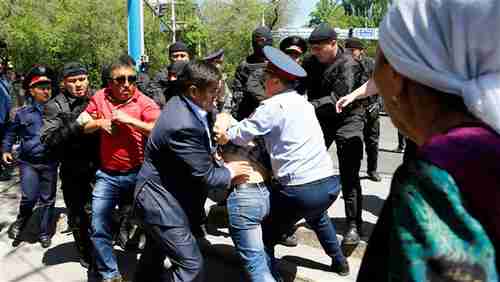 |
Authorities in Kazakhstan reacted harshly to protests announced for Saturday by detaining possibly hundreds of journalists, activists and demonstrators. Police in full riot gear broke up the protests on Saturday, and dozens more were arrested in cities across the country.
They're protesting against a planned "Land Reform" program. The program would make it easier for foreigners to buy farmland or rent it for 25 years. Protesters fear that the changes would make it easier for large Chinese agribusinesses to take control of vast swaths of farmland. According to one protester, "We can't give land to the Chinese. If they come then they won't leave!" China shares a lengthy border with Kazakhstan and has been heavily investing in its energy sector and infrastructure.
The new law was approved in November, but only comes into effect on July 1. In the last round of protests, on April 27, there were one or two thousand people in each city, which is quite serious for Kazakhstan where no dissent is tolerated. Authorities fear a repeat of the huge protests in 2011, when oil workers went on strike, and 14 people were killed by police gunfire.
Kazakhstan is heavily dependent on oil exports and because of the drop in oil prices, its revenues plummeted creating budget deficit. The government had to decrease its expenditure, and the national currency lost half of its value, although it's slowly recovering now as oil prices are going up.
The collapse in global commodity prices, especially oil, drove Russia into recession, and has had s big ripple effect throughout central Asia, whose economies are dependent on Russia through subsidies and migrant labor. Kazakhstan's currency, the tenge, has lost 50% of its value against the US dollar, and other currencies in the region have suffered similarly.
Although the proposed Land Reform law triggered the riots and protests, the downward spiraling economy has turned it into general protests again Kazakhstan's president Nursultan Nazarbayev, who was First Secretary of the Communist Party of Kazakhstan in the last few years of the Soviet Empire, and then became president in 1991 when the Soviet Empire collapsed.
On May 5, Nazarbayev announced that the Land Reform would be put on hold, until the new laws could be discussed publicly. That was a huge concession to the activists, and perhaps was as much a sign of panic as anything else, but it didn't stop the protests from happening anyway on Saturday. EurasiaNet and Press TV (Tehran) and BBC (28-Apr) and Jamestown
According to the Pentagon, a US drone strike into Pakistan's Balochistan province, has "likely" killed Mullah Akhtar Mohammad Mansour.
Mansour's rise to power came about in a bizarre way. His predecessor was Mullah Omar, who was the nominal leader of Afghan Taliban until his death was announced in July of last year. But when his death was announced, the announcement said that he had died in April 2013. In other words, for over two years of being leader of the Taliban, he was dead.
At that point, Mansour rose to leadership, but he has not been accepted as leader by all factions, with the result of extremely bitter political infighting within the Taliban.
Nonetheless, in recent months the Taliban has been expanding operations in Afghanistan's south, and has captured several key districts, leading many to believe that President Obama will be forced to leave a large military contingent in Afghanistan at the end of his term.
Mansour's whereabouts are a closely guarded secret, so if Mansour has indeed been killed by an American drone strike, it would have to have been done with intelligence from sources within the Taliban itself. Confirmation of Mansour's death would have to come from announcement by the Taliban.
The death of Mansour, if confirmed, will not mean the end of the Taliban, just as the death of Osama bin Laden did not prevent continuing operations by al-Qaeda and did not prevent the rise of the so-called Islamic State (IS or ISIS or ISIL or Daesh). One possible scenario is that his death would worsen the political infighting in the Taliban. Another possible scenario is that an even more hardline leader will be chose, someone who will unite all the Taliban factions and end the infighting. AP and Foreign Policy
(Comments: For reader comments, questions and discussion, see the 22-May-16 World View -- Afghan Taliban leader reportedly killed by US drone strike in Pakistan thread of the Generational Dynamics forum. Comments may be
posted anonymously.)
(22-May-2016)
Permanent Link
Receive daily World View columns by e-mail
Donate to Generational Dynamics via PayPal
Downed EgyptAir flight an economic disaster for Egypt
This morning's key headlines from GenerationalDynamics.com
 |
At this writing, new evidence indicates that there was an electrical fire in the toilet and electronics of EgyptAir Flight 804, which went down in the Mediterranean Sea on Thursday, killing all 66 people onboard, as it traveled from Paris to Cairo. It's not known if the fire was the cause of the downing, or if the fire was a byproduct of a terror attack.
Either way, it's a disaster for Egypt's tourism industry and economy in general, which has already been spiraling downward. This was the third attack on Egypt's passenger aviation in just the last six months. In March, an EgyptAir flight was hijacked by a man wearing a fake explosive belt, and forced to land in Cyprus.
And in November, a passenger plane exploded over northern Sinai, 23 minutes after taking off from Egypt’s Sharm el-Sheikh airport on the Sinai Peninsula, heading for St. Petersburg Russia. That was not an Egyptian plane but was a Russian plane, Metrojet flight 9268, but that makes little difference given that it was blown up over Egypt.
Going beyond aviation disasters, there have been several terrorist bombings in Egypt, and the north Sinai is almost a war zone.
The tourism industry contributes about 11 per cent of the country’s gross domestic product and employs about 12 per cent of the workforce. However, the number of tourists travelling to Egypt has fallen from 2.2 million in the first quarter of 2015 to about 1.2 million in the first quarter of 2016. Egypt's beach resorts are almost deserted, and even usually popular sites such as Giza’s pyramids and Great Sphinx have few visitors anymore. The new airline disaster is going make these bad figures even worse.
During the regime of Hosni Mubarak, Egypt was a tourism powerhouse, but the number of visitors has been falling since the 2011 Arab Spring and the overthrow of Mubarak, and even more since the army coup, led by current president Abdel al-Fattah al-Sisi, to oust the Muslim Brotherhood government of Mohammed Morsi in 2013. International Business Times and CNN and BBC (9-Jan)
The EU-Turkey refugee deal has drastically reduced the flow of migrants crossing the Aegean Sea from Turkey to Greece. But the EU has left Greece on its own to deal with the tens of thousands of migrants that already arrived, including many that are crowded filthy refugee camps.
The EU had promised Greece that EU member countries would send a staff of 2,300 experts -- police, case officers, judges, and language interpreters -- to help process asylum requests, and the EU has not supplied that staff. Nor has the EU resolved the question about how approved Syrian refugees are to be distributed to the EU member countries, as many EU nations are stalling or refusing to accept more migrants.
The EU has simply blown off its obligations, leaving it to Turkey to take of the problem for them. The EU is desperately dependent on Turkey, and soon will have to fulfill it's part of the EU-Turkey deal: Allowing 70 million Turkish citizens to have visa-free travel in Europe's Schengen Zone. Turkey's president Recep Tayyip Erdogan has forcefully and frequently repeated his threat that he will cancel the refugee deal and open the floodgates if the EU reneges on the visa-free travel.
Many Europeans dislike they idea under any circumstances. The eastern European nations that were part of the Ottoman Empire are opposed, and there are other groups of people who simply dislike Turks.
But it's been made even more difficult because of Erdogan's increasingly authoritarian government, especially crushing freedom of speech by seizing the country's largest opposition newspaper. ( "6-Mar-16 World View -- Turkey's 'shameful day for free press' as government seizes Zaman media")
Europeans have also been concerned Erdogan's harsh use of anti-terrorism laws against Turkey's Kurdish minority. Those concerns were made even stronger on Friday when the parliament passed a constitutional amendment removing prosecutorial immunity from MPs. The amendment is particularly targeted to deputies from the Kurdish Peoples' Democratic Party (HDP). The passage of the amendment will permit Erdogan to have Kurdish members of parliament prosecuted and possibly jailed on terrorism charges.
For the European Parliament to willingly approve Turkey's visa-free travel, Turkey will have to change its laws -- something that's not going to happen, and something that the increasingly authoritarian and tyrannical Erdogan feels is not necessary since the EU is desperate. But the increasingly nationalistic and xenophobic European parliament may refuse to approve visa-free travel anyway, leading to dark confrontation between the EU and Turkey. Hurriyet (Ankara) and Deutsche Welle
(Comments: For reader comments, questions and discussion, see the 21-May-16 World View -- A dark shadow looms over EU-Turkey refugee deal, as Turkey passes harsh anti-Kurdish law thread of the Generational Dynamics forum. Comments may be
posted anonymously.)
(21-May-2016)
Permanent Link
Receive daily World View columns by e-mail
Donate to Generational Dynamics via PayPal
Lieberman's lack of experience compared to Amir Peretz
This morning's key headlines from GenerationalDynamics.com
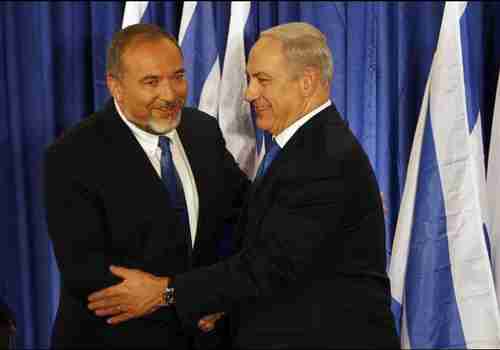 |
Press reports from Israel and around the world are almost unanimous in condemning the choice by Israel's prime minister Benjamin Netanyanu for the new Defense Minister to be minister Avigdor Lieberman, head of the Yisrael Beiteinu ("Israel is our home") political party, forming what liberals are calling 'most right-wing government in history
Yisrael Beiteinu holds five or six seats of the 120 in the Knesset (Israel's parliament). Netanyahu has been governing with a razor-thin majority of 61 seats, and joining with Yisrael Beiteinu gives him at least 66 seats.
Lieberman is usually described as "a hard right racist," because of his anti-Arab rhetoric. He questions Palestinian Authority President Mahmoud Abbas’s commitment to peace, and he also questions the loyalty of Arab citizens of Israel, and has proposed deporting Arabs who cannot pass a loyalty test. He also led a recent parliamentary drive to exclude Arab parties from running for election, a move that was overturned by Israel’s supreme court.
A Palestinian Authority (PA) statement said that the appointment of Lieberman means that the PA no longer has a partner in the peace process. "The appointment of Lieberman to serve as a minister in Netanyahu's government is an answer to the regional, international and French efforts to reinvigorate the Israeli-Palestinian peace process."
From the point of view of Generational Dynamics, the selection of a far-right defense minister is part of a movement to the right in countries around the world, with increased nationalism and xenophobia, as I've been writing about for years. This is what happens during a generational Crisis era. It's what happened in the 1930s, and it's what happening today. Ynet (Israel) and Forward (Israel) and AFP
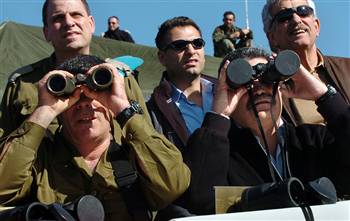 |
Avigdor Lieberman has had no military experience, and so he's being compared to Israel's previous Defense Minister who had no previous military experience -- Amir Peretz.
In 2007, I and others mocked Peretz mercilessly because he was photographed, while reviewing a military drill in the Golan Heights, by looking through binoculars without removing the lens cap. (From February 2007: "This week's idiot of the week: Israeli defense minister Peretz".)
In other words, the person in charge of the army didn't know how binoculars worked. If that were his only sin, it might have been forgotten by now.
But Peretz was also responsible for the 2006 war against Hezbollah in Lebanon. That war was a total disaster for Israel. When two Israeli soldiers were abducted by Hezbollah, Israel went into a state of total panic, and launched the war in Lebanon within four hours, with no plan and no objectives. In the next few weeks, the supposed objectives changed on an almost daily basis. ( "How Israel panicked in pursuing the summer Lebanon war with Hizbollah.")
Lieberman will presumably not make the same kinds of mistakes that Peretz did, but maybe he will. At any rate, Peretz's experience illustrates the enormous dangers of putting a politician in charge of an organization, when the politician doesn't have the vaguest clue what he's doing. Jewish Telegraphic Agency
(Comments: For reader comments, questions and discussion, see the 20-May-16 World View -- Netanyahu's selection of Avigdor Lieberman criticized in and out of Israel thread of the Generational Dynamics forum. Comments may be
posted anonymously.)
(20-May-2016)
Permanent Link
Receive daily World View columns by e-mail
Donate to Generational Dynamics via PayPal
Hong Kong's history and culture make it very different from China
This morning's key headlines from GenerationalDynamics.com
 |
China's state leader Zhang Dejiang, making a three-day "inspection visit" to Hong Kong, criticized Hong Kong who protest against Beijing policies. Nominally, the purpose of the speech was to describe Hong Kong's role in Beijing’s "One Belt, One Road" trade initiative. But there was also an iron hand. Zhang, a member of China’s all-powerful Politburo Standing Committee, made clear in his speech that calls for independence of Hong Kong from China would not be tolerated.
Hong Kong residents were promised fully free and fair elections when Britain returned the British colony over to China in 1997. China has consistently stalled on the promise, triggering the large protests in mid-2014 that shut down the business district for weeks. These protests were mostly peaceful, but there were some clashes with police. The protests were called the "Umbrella Revolution," after protesters brought umbrellas to protect themselves from police teargas.
The particular trigger for the 2014 protests was a demand by China that the "free" elections in Hong Kong in 2017 would be tightly controlled by Beijing. The elections would be "free," but the only candidates who will be permitted to be run have to be approved a "nominating committee" completely controlled by Beijing. China's hand-picked Hong Kong leader, Leung Chun-ying, announced that there was no chance whatsoever that Beijing would yield on this. ( "22-Oct-14 World View -- Hong Kong leader suggests that the poor shouldn't be allowed to vote")
Now, almost two years later, China's state leader Zhang Dejiang is making an "inspection visit" to make sure that everyone understands that Beijing has not softened its position:
"'One country, two systems' has ... won wide recognition in the international community. This did not come easily, and deserves pride and protection.It should be respected that Hong Kong compatriots treasure their lifestyle and values – in fact, the substance of the One Country, Two Systems principle was to preserve Hong Kong’s original socioeconomic system and lifestyle.
Now an extreme small minority have rejected the country, rejected the Central Government, and even put forward for Hong Kong independence – this is not an issue of localism, but an issue of using the name of localism to separate the country. Is that violating the original intention of One Country, Two Systems? Is this good or bad for Hong Kong? I believe Hong Kong people have their answers in mind."
Zhang added that he would like to listen opinions and suggestions from people from all walks of life. Hong Kong Free Press and South China Morning Post and Xinhua
The heart of Hong Kong resembled an armed camp yesterday as thousands of police officers were deployed around the convention center where Zhang was speaking. At the convention center, barricades filled with water were set up to keep protesters at least 100 feet away. Construction sites were halted, trash bins were removed and paving stones were glued together, to keep them from being tossed at police during a riot in February of this year.
Culturally, Hong Kong is closer to the West than it is to China. Hong Kong was governed by Britain from 1857 until it was handed over to China in 1997. Throughout this 140 year period, Hong Kong served as a refuge, an escape from mainland China.
Hong Kong served as a refuge for exiles from China following the establishment of the Chinese Republic in 1912. After Japan seized Manchuria in 1932 and the Sino-Japanese war broke out in 1938, China turned to Britain, with Hong Kong as an intermediary, for help and supplies. As Japan advanced into China in World War II, hundreds of thousands of Chinese took refuge in Hong Kong.
China had a massive, bloody civil war starting in 1934, which was interrupted by World War II and resumed afterwards. Mao Zedong's Communist Revolution didn't end until 1949, but then the defeated "Nationalist" forces under Chiang Kai-shek fled to Hong Kong, and from there to Formosa, which became part of Taiwan.
So Hong Kong and Taiwan have cultural and historical links with each other. Anti-Beijing protests and riots in one are likely to spur anti-Beijing protests and riots in the other.
A sign of the cultural contrasts is the differences in language. On mainland China, the official language is Mandarin Chinese. The language of the people of Hong Kong is Cantonese, which is the language of the indigenous Cantonese people in Hong Kong and eastern parts of the mainland. The languages of Taiwan, including Min Nan and Hakka, are also indigenous languages.
From the point of view of Generational Dynamics, China is headed not only for internal wars with Hong Kong and Taiwan, but also external wars with the United States and other countries.
As I've been writing since 2005 ("China approaches Civil War"), China is headed for a new civil war, refighting many of the previous local rebellions, including the huge White Lotus rebellion in the 1790s and 1800s decade, the Taiping Rebellion in the 1850s and 60s that killed 15% of the population, and Mao's Long March that launched the civil war between Mao and Chiang Kai-shek in the 1930s and 40s killed tens of millions.
At the same time, China is headed for war with its ancient external enemies, Vietnam, the Philippines and Japan, as well as the United States. These two wars -- the civil wars and the external wars -- will occur simultaneously, as happened in World War II. In fact, the Chinese Communist Party, which is the most paranoid organization in the world, will blame any internal unrest on outside agitators, and may use that as an excuse to launch an external war, in the hope of unifying the country, and attempting to insure its own survival at all costs. Quartz and Today Online (Singapore) and Bloomberg and AP
(Comments: For reader comments, questions and discussion, see the 19-May-16 World View -- Chinese official slams Hong Kong independence during 'inspection visit' thread of the Generational Dynamics forum. Comments may be
posted anonymously.)
(19-May-2016)
Permanent Link
Receive daily World View columns by e-mail
Donate to Generational Dynamics via PayPal
Syria peace talks in Vienna collapse in farce - again
This morning's key headlines from GenerationalDynamics.com
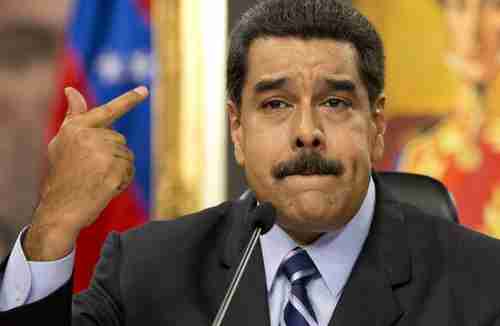 |
Venezuela's president Nicolás Maduro on Tuesday renewed his accusation that the collapse of the country's economy is being caused by United States sabotage. ( "15-May-16 World View -- Venezuela economy close to collapse as Maduro orders jailing of factory owners")
And he accused the United States of planning an imminent invasions because, he claimed, two American military surveillance planes had illegally entered Venezuelan airspace last week.
According to Maduro on Tuesday:
"Our military aviation detected the illegal entry, for unusual espionage tasks, of the Boeing 707 E-3 Sentry, which is an airborne early warning control center system that has all the mechanisms for espionage. ...Washington conducts these tasks to support communications of armed groups in war zones or to prepare actions to disable electronic equipment of the government, the armed forces or the economy."
Maduro has decreed a state of emergency, giving himself additional powers that will permit the use of violence and arrests against opposition protests.
Opposition leader Henrique Capriles told his followers to ignore the decree, said that the army has to make a choice:
"We, Venezuelans, will not accept this decree. This is Maduro putting himself above the constitution. To impose this, he'd better start preparing to deploy the war tanks and military jets.And I tell the armed forces: The hour of truth is coming, to decide whether you are with the constitution or with Maduro."
Capriles called on its supporters to take to the streets again Wednesday. BBC and TeleSurTV (Caracas) and Deutsche Welle
Every month, the Syria peace talks start up, then collapse a few days later. Then they would be restarted, and the cycle repeats. I've reported on several rounds of this just in the last few months.
So it's not surprising that the latest round of peace talks has collapsed, but this time the impasse is a lot worse since they didn't even bother to schedule a new date for the peace talks to restart, as they've always done in the past.
The UN Special Envoy for Syria, Staffan de Mistura, said that Syria might return to full scale war unless the peace talks could resume, and added some political bromides:
"We need to bear in mind that credible intra-Syrian talks will become credible when [...] there is a credible development on the cessation of hostilities and a credible improvement on the humanitarian side."
In other words, there couldn't be any peace talks between the Syrian regime and the opposition as long as they were still shooting at each other.
US Secretary of State John Kerry as usual made a statement that sounded like an SNL skit:
"The challenge that we face now is to transform these possibilities into the reality of an agreement at some point. And because of the gains that we've made in recent months, yet because of their fragility, and we acknowledge they're fragile, and increasingly threatened by irresponsible and dangerous actions taken by those who would rather have this effort fail, who want to create problems, cause rather than solutions, they see a different outcome, and there are frankly actors on both side."
Kerry referred to "those who would rather have this effort fail," and that includes pretty much everyone, though for different reasons:
So it's not surprising that the International Syria Support Group (ISSG), which was meeting in Vienna and which comprises the United States, Russia, the UN, the Arab League, the European Union, and 16 countries, announced on Tuesday that they had, once again, failed to reach any agreement to bring peace to Syria. The whole thing is an international farce.
People always criticize me when I call al-Assad a genocidal monster, but he's clearly comparable to Hitler, Pol Pot, Mao Zedong and Stalin from the last century. There is no mass weapon of destruction, nor any gruesome form of torture, that he won't use to satisfy his psychopathy.
Al-Assad is the lynchpin and the engine behind the Syrian war. It would never have started without him, and would have ended quickly if he had let it, or if he hadn't been supported by Russia and Iran. Thanks to his policy of exterminating Sunni civilians, tens of thousands of young jihadists have come from around the world to Syria to fight him. This has resulted in the creation of ISIS, and it's resulted in millions of refugees flooding neighboring countries, including countries in Europe.
I've written thousands of Generational Dynamics analyses since 2003, which is the year that the current generational Crisis era began, and although the types of behavior we're seeing were all predictable and were all predicted, it's incredible to see them being played out on the world stage. The world is changing rapidly, as we're seeing people, especially young people, support Socialism, racism, and xenophobia in country after country exactly like the 1930s. These young people have no knowledge of history and the massive disasters caused by the Socialism or racism or the Holocaust, and are not even fazed as we see Socialist Venezuela collapse right before our very eyes.
In 2013, when Hugo Chávez died, Hollywood liberals Sean Penn, Michael Moore and Oliver Stone were effusive in their praise, but we haven't been hearing from them lately. Also, Britain's new ultra-left Labor Party leader Jeremy Corbyn tweeted:
"Thanks Hugo Chavez for showing that the poor matter and wealth can be shared. He made massive contributions to Venezuela & a very wide world"
The pathological stupidity of these people is amazing.
Meanwhile, the incredible geopolitical destruction being perpetrated by Bashar al-Assad is not only tolerated, but is praised by Russia, Iran and other acolytes. As I've said before, what's happening today is beyond belief to me, as if I'm watching a bad movie but I can't leave the movie theatre. But it's increasingly obvious to me what caused World War II, and that exactly the same things are happening today. United Nations and AFP and Washington Times and Twitter
(Comments: For reader comments, questions and discussion, see the 18-May-16 World View -- Venezuela's Maduro accuses US of planning an imminent invasion thread of the Generational Dynamics forum. Comments may be
posted anonymously.)
(18-May-2016)
Permanent Link
Receive daily World View columns by e-mail
Donate to Generational Dynamics via PayPal
ISIS continues to grow in Libya in size and effectiveness
This morning's key headlines from GenerationalDynamics.com
 |
The headline on this article seems a bit perverse, doesn't it. How is lifting the arms embargo on Libya going to fight ISIS? A lot of people are wondering exactly that.
On Monday, officials from 25 countries in Europe and the Middle East met in Vienna, in a meeting jointly chaired by the U.S. and Italy, to discuss what to do about the rapid growth of the so-called Islamic State (IS or ISIS or ISIL or Daesh) in Libya. The decision was to supply arms to Libya's "unity government," the Government of National Accord (GNA), which is backed by the United Nations.
Despite the continuing growth of the so-called Islamic State (IS or ISIS or ISIL or Daesh) in Libya, and the danger that this represents not only to northern Africa but also to Europe, Western powers are unable to agree on a form of military action that will destroy ISIS or even stop its growth. As we reported in January, Western countries felt that it was urgent to mount a military action in Libya by the beginning of March. ( "6-Jan-16 World View -- US, Britain, France preparing new Libya military offensive early in 2016")
However Italy, Libya's former colonial power, has always insisted that Libya's government had to approve any Western military action before it could occur. That's been a continuing problem, since there are two major governments in Libya, one in Tripoli in charge of western Libya and one in Tobruk in charge of eastern Libya. There are also nearly 2,000 militias running different parts of Libya.
The United Nations approved Government of National Accord (GNA) has received some level of approval from the government in Tripoli, but little from the government in Tobruk. The GNA controls only a fraction of Libya, and only a fraction of the militias.
The result is that Italy has decided that it's too early to send in troops. Italy's defense minister Roberta Pinotti says, "The first step to stabilize Libya is having a government that can represent the different parts, and can thus take the necessary step to make a request to the international community."
Reports in March seemed to suggest that Italy might send up to 5,000 troops. By late April, that number was said to be closer to 900. But now, Italy will not even contribute troops to a peacekeeping force, and reports indicate that the U.N. Support Mission in Libya (UNSML) would instead be bolstered by Nepalese troops instead.
Monday's decision to lift the arms embargo in Libya has been derided by some analysts as "kicking the can down the road." First, Libya is already awash in weapons that were left behind in weapons stores previously owned by Muammar Gaddafi before he was overthrown. Second, the government in Tobruk has been receiving weapons allies, and so has gotten around the embargo. Third, lifting the arms embargo may end up benefitting ISIS, by making it easier for them to import arms.
The bottom line is that Western nations can only watch as ISIS becomes larger and more powerful in Libya. Western leaders and Western publics have little appetite for any military intervention in Libya, and so it will probably take some major crisis event to change things. BBC and Washington Post and Guardian (London) and Washington Post
The ISIS stronghold in Libya is in Sirte, from which it controls a strip of more than 250 km (155 miles) of Libya’s central coastline, from which it has launched attacks to the east, west and south. ISIS forces last week launched a surprise attack on local militias, enabling it to capture several towns southwest of Sirte, increasing the area it controls.
There are signs of increased cooperation between Boko Haram in Nigeria and ISIS in Libya. Both Boko Haram and ISIS have become increasingly effective with time, and analysts are now concerned that the ties between the two terrorist organizations could herald a push south into the vast, lawless Sahel region and create a springboard for wider attacks.
ISIS has also been stepping up attacks on neighboring Tunisia from its strongholds in Libya, where it has set up training camps. In March, ISIS launched a major assault on the town of Ben Guerdane in Tunisia, on the border with Libya. More than 4,000 Tunisians are thought to have left to fight for ISIS and other militant groups in Iraq and Syria. Some are returning to join ISIS in Libya, threatening more attacks on Tunisia.
Last week, the United States said it would give jeeps, communications technology and small aircraft to Tunisia to help protect the border with Libya. The US is already striking training camps in Libya to protect Tunisia. ( "20-Feb-16 World View -- US warplanes strike suspected ISIS training base in Libya")
Concerns are also growing because of the EU-Turkey migrant deal, which has reduced the flow of migrants from Turkey into Greece. The flow of migrants from Syria and Iraq has been irrepressible, and reports indicate that human traffickers are planning to use different routes. It's possible that there may be hundreds of thousands of migrants crossing from Libya to Europe this summer. Many of the human traffickers in Libya are part of ISIS, and the surge in migrants will pour a lot of money into ISIS coffers. Telegraph (London) and Asharq Al-Awsat (London) and Reuters and Business Insider
(Comments: For reader comments, questions and discussion, see the 17-May-16 World View -- Western nations agree to lift arms embargo on Libya to fight ISIS thread of the Generational Dynamics forum. Comments may be
posted anonymously.)
(17-May-2016)
Permanent Link
Receive daily World View columns by e-mail
Donate to Generational Dynamics via PayPal
Pentagon documents massive China buildup, but omits 'Maritime Militia'
This morning's key headlines from GenerationalDynamics.com
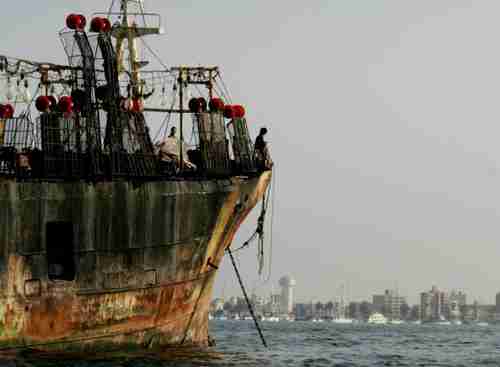 |
China on Friday accused the Pentagon of "sensationalizing" China's military buildup in the South China Sea, claiming that China has "the legitimate right to deploy military facilities on its own islands in the South China Sea." The problem with this claim is that China is using its vast military power to annex regions of the South China Sea that have historically belonged to other countries, including Vietnam and the Philippines.
China always says that its claims "are indisputable," and this much at least is a total lie since the claims are very much in dispute, and are currently being adjudicated by a United Nations international court in the Hague, which is expected to rule on counterclaims by the Philippines very soon, possibly by the end of May.
Friday's Pentagon report documents a massive buildup in the size, sophistication and power of China's military, including the the South China Sea. The Chinese response is essentially to call the Americans war-mongers, for documenting China's military buildup, and for freedom of navigation patrols in the South China Sea.
Statements by Chinese officials include the following:
"There’s no difference between China’s deployment of defense facilities on its own territory and the defense installation by the US in Hawaii. ...We don’t hope to see militarized close-in reconnaissance by the US military. Nor do we want to see more missile destroyers or strategic fighters coming to this region. This is what all sides need to take for a responsible behavior on demilitarization. ...
The US has increasingly dispatched military vessels and aircraft to the adjacent waters and airspace of China’s islands in the South China Sea. It has engaged in highly targeted military exercises and joint patrols. The US is turning a blind eye to its own militarization and has made irresponsible accusations about China. This is a typical double standard. ...
Recent actions by the US have severely damaged mutual trust between the two sides, and violates the consensus reached by two sides. We urge the US to take concrete measures to remove obstacles for healthy development."
Secretary of Defense Ash Carter has repeatedly said that "The United States will fly, sail, and operate wherever international law allows, as we do all around the world."
These freedom of navigation patrols are infuriating the Chinese. In China's Alice in Wonderland world, freedom of navigation patrols are the biggest military actions, not building several massive military bases in the South China Sea on top of artificial islands. Dept. of Defense - China military report and China TV and Defense News
Friday's Pentagon report documents a massive buildup in the size, sophistication and power of China's military, in a way that indicates that the situation has changed in a significant way. In the past, Americans have soothed themselves by saying that despite China's buildup, and their obvious preparations for a first strike military attack on the United States, America's military is still capable of fending off a pre-emptive Chinese attack.
However, the tone of the report suggests that China's military buildup is just about at a tipping point, where it could overwhelm American defense forces. This had to happen sometime, as America's military has been cutting back and China's has been building up. At some point, China's military had to surpass America's and the tone of the report suggests that that time is now or very soon.
Here are some highlights:
However, the Pentagon reports omits discussion of a major portion of China's naval military capabilities: The "Maritime Militia." This is a secret force of fishing vessels that patrol the South China Sea and act as a guerrilla force under civilian cover, occupying and helping to build disputed islands. National Interest and Reuters and Australian Broadcasting and International Business Times (Singapore)
(Comments: For reader comments, questions and discussion, see the 16-May-16 World View -- China says Pentagon report on China military 'severely damages' relations thread of the Generational Dynamics forum. Comments may be
posted anonymously.)
(16-May-2016)
Permanent Link
Receive daily World View columns by e-mail
Donate to Generational Dynamics via PayPal
Maduro recalls Brazil ambassador over Dilma Rousseff 'coup'
This morning's key headlines from GenerationalDynamics.com
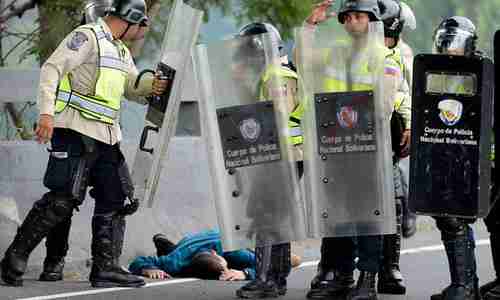 |
Pity the poor Venezuelan citizen who enjoyed years of free Socialist giveaways under president Hugo Chávez and more recently president Nicolás Maduro, and now has to pay for it all, as Chávez's Socialist paradise faces financial disaster.
The inflation rate in 2015 was 275%, the highest in the world, and it's continued to surge. The International Monetary Fund (IMF) estimates that it will reach 720% in 2016, and over 2200% in 2017.
Maduro's government is drenched in corruption, with officials not giving a s--t about anyone but themselves. Common staples are in scarce supply, and citizens have to stand in line to get milk, rice, flour, ketchup, diapers, and toilet paper. Crime and violence are becoming rampant. And the fall into hell has been rapid -- 75% of Venezuelan homes now live in poverty, compared to 27% just two years ago.
New indignities keep getting piled on, one after the other:
Oh, wait. Maduro has found a solution. He's ordered a 30% increase in the minimum wage. Increasing the minimum wage 30% is sure to cause even greater super-inflation and even deeper shortages, but logic never stops a Socialist loon.
Maduro's opposition have collected two million signatures on a petition to force a recall vote that would remove Maduro from power, but Maduro has control of the courts and all national agencies. One of those agencies that Maduro controls is the National Electoral Board (CNE) which supposed to have certified the signatures a week ago, but under Maduro's orders they're stalling.
Opposition leader and former presidential candidate Henrique Capriles said on Saturday that if Maduro blocks the recall referendum, then the country "can explode at any given moment."
Maduro has announced that's calling out the army for military drills starting on Saturday, to protect the country from "foreign aggression," meaning the United States. Since the United States has no plans to invade Venezuela, it's more likely that Maduro will use the military to attack protestors violently, which is what Socialists always do to stay in power. Miami Herald and Reuters (11-Apr) and VOA (2-May) and Bloomberg (27-Apr) and VOA (1-May)
As we mentioned above, the country's largest producer of beer has closed down the last of its four domestic breweries, for lack of the imported malted barley needed as the principal ingredient. Cerveceria Polar, the manufacturer, is blaming the problem on Venezuela's government for not giving the company the dollars it needs to import supplies.
Venezuelan citizens are only allowed to have inflation-bloated and increasingly worthless currency, the Bolivar. Dollars are tightly controlled by the government, and have been in particularly short supply since the price of oil crashed over the last two years. Cerveceria Polar and other manufacturing firms have been forced to close their doors because they couldn't import the goods they needed.
Like all good Socialists, president Maduro has a ready solution.
On Friday, Maduro declared a full-scale state of emergency. If a factory has closed because they were unable to import what they need to make their products, then Maduro will have the factory seized and the factory owner jailed.
According to Maduro, the country is facing an "economic war," led by the United States. BBC and Fox News and USA Today (8-May)
Venezuela's president Nicolás Maduro recalled his ambassador to Brazil, Alberto Castelar, following a vote by Brazil's parliament to suspend president Dilma Rousseff from office and subject her to an impeachment trial on charges of corruption. The debate in Brazil that preceded the vote lasted for days, and resulted in wild protests and fury from both opponents and supporters of Rousseff. Rousseff claims that the corruption charges are bogus, and many people agree, saying that Rousseff's real problem is that her left-wing policies have brought the country to near ruin, though not yet as bad off as Venezuela.
Maduro claims that the impeachment vote was actually a palace coup against a democratically elected left-wing government. With Maduro himself facing a recall petition in Venezuela, he has become an ally of Rousseff.
There have been a string of coups and attempted coups against mostly left-wing Latin American leaders in the last decade.
In 2004, there was a coup against Haiti's president Jean-Bertrand Aristide; in 2008, widespread violence left dozens dead as opposition groups sought to oust President Evo Morales; in the early hours of June 28, 2009, the Honduran military kidnapped President Manuel Zelaya and flew him to Costa Rica; on September 30, 2010, the police and military kidnapped Ecuador's president Rafael Correa, who eventually escaped; in June 2012, Peru's left-wing president Fernando Lugo was impeached and removed from office.
Rousseff is just the latest in this string of "coups." Next in line is Maduro, unless he completely destroys the democratic process by ordering the army to use violence against his political enemies. Reuters and TeleSur TV (Caracas)
(Comments: For reader comments, questions and discussion, see the 15-May-16 World View -- Venezuela economy close to collapse as Maduro orders jailing of factory owners thread of the Generational Dynamics forum. Comments may be
posted anonymously.)
(15-May-2016)
Permanent Link
Receive daily World View columns by e-mail
Donate to Generational Dynamics via PayPal
Hezbollah suffers blow in death of top commander Mustafa Amine Badreddine
This morning's key headlines from GenerationalDynamics.com
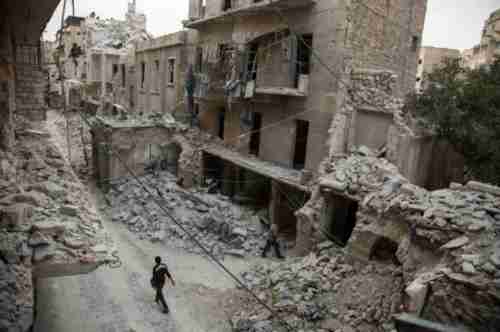 |
Thousands of people on Friday attended the funeral in Beirut, Lebanon, of Hezbollah's top military commander Mustafa Amine Badreddine, who was leading Hezbollah's forces in the war in Syria. The death of Badreddine is a huge embarrassment to the terrorist group Hezbollah and to Hezbollah's puppetmasters in Iran. Iranian officials immediately claimed that Badreddine was killed by a "huge blast" in Damascus, the capital city of Syria, and that the blast was caused by an Israeli air strike. However, Iran quickly backed down from that claim, since after all that claim would be even more embarrassing to Hezbollah and Iran than the truth.
The truth is that Badreddine was killed a week ago while leading Hezbollah and Iranian forces in Khan Tuman in Iran's disastrous battle of Aleppo. It's believed that he was killed in battle, although there are unconfirmed conspiracy claims that either the Syrian regime or Israel had something to do with his death.
Hezbollah praised the "Martyr Badreddine": In 1982, he formed jihadist groups to confront the Zionist entity. After becoming commander in 1992, he prepared many heroic operations against the Israeli occupation. With the inception of Syrian crisis in 2011, the martyr was one of the first commanders who confronted the takfiri plot across Syria, according to Hezbollah.
Badreddine's death brings to an end a long manhunt by Israeli and Western intelligence services for the guerrilla leader who has managed to remain in the shadows while taking part in assassinations and military operations. Independent (London) and AEI Iran Tracker (13-May) and Al Manar (Hezbollah)
All last year, until Russia actively entered the war in Syria, we were reporting that Syria's army was losing one city after another to the opponents of Syria's president Bashar al-Assad. ( "5-Jun-2015 World View -- With Syria's army nearing collapse, Iran plans massive troop deployment")
A major objective of Russia's entry into the war was the recapture of Aleppo from opposition forces. For the past few months, there have been massive forces -- combining forces from Syria's regime army, Hezbollah, and Iran's Islamic Revolution Guards Corps (IRGC) -- focused on the recapture of Aleppo. ( "19-Feb-16 World View -- Russia's attacks on civilian hospitals in Aleppo follow the 'Grozny model'")
On May 6, IRGC forces were caught by surprise by an attack on Khan Tuman, south of Aleppo, by anti-Assad forces, killing and capturing about two dozen IRGC fighters, at a time when there was supposed to be a cease-fire in progress. This is the same battle in which Hezbollah's top military commander Mustafa Amine Badreddine was killed.
Former commander of the 1980s Iran-Iraq War, retired general Mohsen Rezaei, was brought out of retirement, possibly to provide guidance to the IRGC forces in Aleppo. He said:
"Some months ago Khan Tuman in south Aleppo was freed, but a few days ago, takfiris, taking advantage of a cease-fire at a time neither a plane nor artillery was active, surprise attacked Syrian forces and Iranian advisers.[Expressing anger and dismay over the IRGC losses:] Their martyrdom shall not remain unavenged. We will liberate Aleppo soon and wipe out the takfiri terrorists."
IRGC major-general Qassem Soleimani was also dispatched to the region to provide moral support.
The loss of several dozen IRGC fighters is not a significant loss militarily, but it has big symbolic significance. It's the first major setback for the IRGC forces in Aleppo. Other IRGC forces have suffered losses in other places in Syria, though not at this level. The strategic logic of Iran’s mission in Syria will likely drive the IRGC toward greater escalation in response to this setback. The Guard will want to avenge this defeat, moreover, and re-establish its credibility in the fight around Aleppo, which remains a strategically important prize for the Assad regime. Al-Monitor and Asharq Al-Awsat (London) and AEI Iran Tracker (12-May)
I like to reference Debka's newsletter because it contains valuable insights into what's going on, but it's written from Israel's point of view, and sometimes gets things wrong. This week's subscriber-only newsletter (sent to me by a subscriber) contains an analysis of the battle to recapture Aleppo, and says that it's being stymied because of conflicting objectives among the three armies -- Russia, Iran and Syria.
After the loss of Khan Tuman and the deaths of IRGC fighters, Syria's president Bashar al-Assad demanded that Iran send more forces to Aleppo to defeat the rebels. Iran refused the request, and just sent IRGC major-general Qassem Soleimani to raise the morale of Iranian and Hezbollah forces, as previously described above.
According to Debka, al-Assad does not want to deploy his own army forces to Aleppo, because he wants to keep them close by in Damascus and Latakia to defend his own regime, even if it means losing Aleppo. This has inevitably infuriated both Iran and Russia, whose troops wonder why they're fighting someone else's battle. Russia in particular has no use for al-Assad except as a way of keeping control of Syria.
Russia's forces entered the Syrian war actively last year to save al-Assad from losing the war. It may be that al-Assad will lose the war anyway. Debka
(Comments: For reader comments, questions and discussion, see the 14-May-16 World View -- Syria's Aleppo campaign falters after disastrous Iranian loss at Khan Tuman thread of the Generational Dynamics forum. Comments may be
posted anonymously.)
(14-May-2016)
Permanent Link
Receive daily World View columns by e-mail
Donate to Generational Dynamics via PayPal
Italy rescues 800 migrants from Mediterranean Sea, many of them from Syria
This morning's key headlines from GenerationalDynamics.com
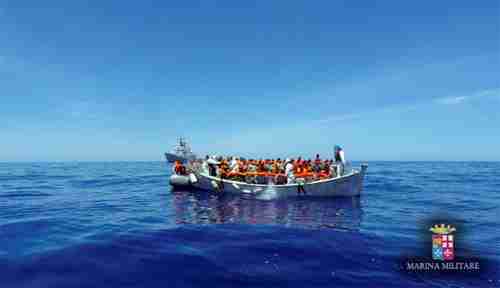 |
Both Turkey and the European Union are issuing ultimatums.
Turkey is demanding that the EU honor its agreement to allow all Turkish citizens to have visa-free travel throughout Europe's Schengen Zone. President Recep Tayyip Erdogan and former prime minister Ahmet Davutoglu have been said repeatedly, since March 20 when the EU-Turkey migrant deal was signed, that the EU must fulfill its pledge to permit visa-free travel by Turkish citizens by June, or else Turkey would cancel the deal and allow floods of migrants to resume flooding across the Aegean Sea to Greece.
The EU is demanding that Turkey must bring its anti-terrorism laws into line with European standards. Turkey's anti-terrorism laws are so broad that they criminalize almost any kind of political dissent, and are used to arrest journalists and academics critical of government policies. They were used as justification for the seizure of the country's largest newspaper, Today's Zaman, because it criticized Erdogan's policies. ( "6-Mar-16 World View -- Turkey's 'shameful day for free press' as government seizes Zaman media")
Changing the anti-terrorism laws was one of the terms of the agreement that the European Union negotiated with Turkey's prime minister Ahmet Davutoglu. There were 72 conditions that Turkey would have to meet before the visa-free travel could be implemented. Almost all of them have been met, but the anti-terrorism change has not. Erdogan was infuriated that Davutoglu made this concession, and fired him last, saying that Turkey could not and would not change its terrorism laws while it is being receiving terror attacks from both the Kurdistan Workers’ Party (PKK) and the so-called Islamic State (IS or ISIS or ISIL or Daesh). ( "7-May-16 World View -- Turkey's Erdogan threatens EU: 'We'll go our own way, you go yours!'")
Turkish officials point out that Turkey is currently hosting the largest number of Syrian refugees in the world with 2.7 million, and has spent more than 7 billion euros meeting their needs. Erdogan says that the EU has a much smaller refugee problem and a much smaller terrorism problem, and that EU officials are hypocritical for criticizing Turkey.
With positioning hardening on both sides, people are looking for a face-saving agreement. Otherwise, the EU-Turkey deal is going to fall apart. Irish Times and Daily Sabah (Ankara) and Hurriyet (Ankara)
For the first time since April 2015, more refugees arrived in Italy by crossing the Mediterranean from Libya than arrived in Greece by crossing the Aegean Sea from Turkey.
The change wsa mostly due to a slowdown of migrants arriving in Greece since the EU-Turkey migrant deal.
In March, 26,971 people arrived in Greece, while 9,676 arrived in Italy.
In April, after the deal 3,462 people arrived in Greece, while 9,149 migrants arrived in Italy.
Migrants arriving in Greece come from Syria, Iraq and Afghanistan. Asylum seekers making their way through the Mediterranean are primarily from Nigeria, Gambia, Somalia and other Sub-Saharan African nations. EU Observer and Bloomberg
There are signs in the last few days that a new wave of refugees from Syria have shifted traveling through Turkey to Greece via the Aegean Sea to a new route from Libya to Italy via the Mediterranean Sea.
The Italian coast guard says that it rescued more than 800 migrants off the coast of Sicily in one day alone, Thursday, and that at least 150 of them were Syrian, and 40 were from Iraq.
Authorities had feared that with the closing of the "Balkan Route" for refugees crossing the Aegean Sea to Greece, people smugglers would begin redirecting refugees to Libya, to cross to Italy. Typically, the people smugglers put hundreds of migrants into a single large rubber dinghy, and give the migrants enough fuel to leave Libyan waters and a cell phone to use to call the Italian coast guard.
Fearing a flood of migrants crossing Brenner Pass from Italy to Austria, Austria is building a fence on the common border. ( "28-Apr-16 World View -- Austria votes to close border with Italy to slow refugees") Austria's plan has received widespread condemnation from human rights groups and many EU officials. Reuters and AFP
(Comments: For reader comments, questions and discussion, see the 13-May-16 World View -- EU-Turkey migrant deal unravels over brinksmanship on both sides thread of the Generational Dynamics forum. Comments may be
posted anonymously.)
(13-May-2016)
Permanent Link
Receive daily World View columns by e-mail
Donate to Generational Dynamics via PayPal
The 'New IRA' recalls the 1916 Easter Rising against British rule
This morning's key headlines from GenerationalDynamics.com
 |
England, Scotland and Wales were put on high alert on Wednesday by possibly imminent threats from the "New IRA" (Irish Republican Army). According to Home Secretary Theresa May:
"The Security Service, MI5, has increased the threat level to Great Britain from Northern Ireland-related terrorism from moderate to substantial.This means that a terrorist attack is a strong possibility and reflects the continuing threat from dissident republican activity.
As a result of this change, we are working closely with the police and other relevant authorities to ensure appropriate security measures are in place."
The increase in the perceived risk to Great Britain from Northern Irish terrorism from "moderate" to "substantial" was caused by a fresh assessment leading to concerns about the increasing capabilities of the dissident groups and their growing desire to attack the mainland. With this rating, a terror attack is considered "a strong possibility," which is not at the level of "highly likely" if the threat level had been raised all the way up to "severe." BBC and Belfast Telegraph (30-Apr) and Daily Mail (London)
On Easter Sunday, March 27 of this year, thousands of soldiers marched through Dublin to commemorate the 100th anniversary of the 1916 Easter Rising, which was an Irish insurgency against the government of the United Kingdom. That was just one of the many clashes between the Irish and the English over the centuries.
Northern Ireland terrorism has been out of the news lately, because of concerns over jihadist terrorism. From the point of view of Generational Dynamics, all religious and ethnic groups have the potential for terrorism at different times. From the point of view of Generational Dynamics, there is little significant difference between terrorism by Catholic drug cartels in Mexico, ethnic terrorism by Protestants and Catholics in Northern Ireland, and Islamist terrorism, with the similarities more significant than the differences. However, at this point in time, terrorism related to Syria is considered to be the greatest terror threat.
Violent paramilitary activity in Northern Ireland has resulted in 1,100 bombings and shootings over the past 10 years, along with almost 800 so-called punishment attacks and 4,000 cases of people being forced out of their homes. There are still thousands of people associated with paramilitary groups responsible for acts of violence and intimidation. Last week, police arrested 14 people in Northern Ireland after the funeral of of Michael 'Mickey' Barr, a "New IRA" member who was gunned down for being a dissident republican.
The violence in Northern Ireland is usually portrayed as religious in nature, where Catholics fight against Protestants.
But from the point of view of Generational Dynamics, it can be called an ethnic conflict between indigenous Gaelic Irish people (usually Catholic, republican, nationalist) versus descendants of invading English and Scottish people (usually Protestant, loyalist, unionist). As is often the case, religion is not the "cause" of this conflict, but is a tool used by the factions to rally supporters.
Generally speaking, the objective of the republicans is to unify the Republic of Ireland (southern Ireland) with Northern Ireland into a single republic, while the unionists (loyalists) want Northern Ireland to remain part of the United Kingdom.
As I described in detail in "23-Jun-2011 News -- Sectarian violence in Northern Ireland grows again", the English and the Gaelics have been fighting generational crisis wars regularly since the 1400s. The most important was the Nine Years War (1594-1603), where the Irish Gaelics attempted to overthrow English rule. The result was the Plantation of Ulster, which Gaelics today refer to as "ethnic cleansing," because the British drove the Gaelics from their land, took it over as landlords, and used the Gaelics as servants.
Those feelings are as strong as ever today among the many of the Irish republicans. That's why, on Easter of this year, the "New IRA" warned:
"The volunteer soldiers of the IRA are ready and determined to take the war to the age old enemy of our nation."
AP and Telegraph (London) and Guardian (London, 29-Mar)
(Comments: For reader comments, questions and discussion, see the 12-May-16 World View -- England threatened with IRA terrorists from Northern Ireland thread of the Generational Dynamics forum. Comments may be
posted anonymously.)
(12-May-2016)
Permanent Link
Receive daily World View columns by e-mail
Donate to Generational Dynamics via PayPal
Nagorno-Karabakh issue still simmers
This morning's key headlines from GenerationalDynamics.com
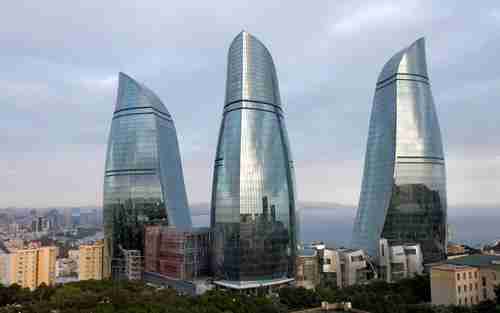 |
Baku, the capital city of Azerbaijan, will host the Days of Culture of Dagestan on May 12-13. The event will feature a concert of Dagestani singers, dancers and musicians, and an exhibition of arts and crafts entitled "Dagestan: History and Modernity". "Lezginka" Academic Dance Ensemble, "Khasavyurt" State Dance Ensemble and soloists will perform in the concert. An assortment of business deals will be signed.
The singing and dancing and jolly atmosphere hides a great deal of tension that both sides would like to ignore.
Dagestan is not an independent country. It's in the North Caucasus, and is one of Russia's southern provinces, and opposite its southern border is Azerbaijan. As with all of Russia's Caucasian provinces, it's populated mostly by Sunni Muslims, many of whom have gone to Syria to fight against the Shia/Alawite army of Bashar al-Assad, often joining the so-called Islamic State (IS or ISIS or ISIL or Daesh).
Although a political border separates Dagestan from Azerbaijan, the ethnic groups that have lived in the region for centuries don't always follow the political boundaries. AzerTag (Baku) and Azerbaijan News
Azerbaijan's population is about 80% Shia Muslim, 15% Sunni Muslim and 3% Christian. The government is secular. As I wrote in "7-Dec-2015 World View -- Azerbaijan faces rising radical Shia Islamist insurgency", Azerbaijan is in the unfortunate situation that it suffers from both a radical Shia Islamist insurgency, and also a radical Sunni Islamist insurgency. The latter is occurring mostly in the north, along the border with Dagestan, where poverty is extensive corruption is widespread, the government is increasingly oppressive, and the gap between rich and poor is growing wider every day.
It's estimated that of 1,500 people from Azerbaijan who have gone to Syria to fight with ISIS are from Sunni groups in the north, on the border with Dagestan. As in Russia and Central Asia, Azerbaijan officials are worried that people who have gone to Syria to join ISIS will return to their homelands to use their newly acquired terrorist skills. Jamestown and Ahlul Bayt News Agency (Iran state media)
Nagorno-Karabakh is an enclave of Armenian citizens in the midst of Azerbaijan. Depending on whose side you're on, NK is either legitimately Armenian territory or else an illegal occupation of Azerbaijan territory by Armenian forces.
Armenia and Azerbaijan got along pretty well during the days when they were both part of the Soviet Union, but they fell into a bloody war after the Soviet Union fell apart in 1991. By the time that the war ended in a cease-fire in 1994, the Armenians had annexed several Azerbaijani regions, including Nagorno-Karabakh.
Low-level violence has been almost continuous since then, with each side typically accusing the other of hundreds of cease-fire violations every week.
However, early in April the low-level conflict spiraled into the worse violence since 1994, with tanks, heavy artillery and helicopters. ( "3-Apr-16 World View -- Armenia-Azerbaijan escalating conflict in Nagorno-Karabakh threatens the entire region")
A new cease-fire was agreed a few days later, with a return to low-level violence, but no one doubts that the region could explode once more, affecting the entire region.
Russia claims to be neutral between the two sides, but few doubt that Russia strongly supports Armenia. On the other hand, Azerbaijan has a Turkic population and is closely allied with Turkey. Thus, an escalation in war between Armenia and Azerbaijan could quickly escalate into a war between Russia and Turkey.
The Armenian government has recently approved a draft bill recognizing the Nagorno-Karabakh region's independence and sent it to the country's parliament. If it becomes law, it might be considered a casus belli by Azerbaijan. For that reason, it's thought that the independence motion is for domestic consumption in Armenia, and there are no plans to push it forward. Moscow Times and Trend (Baku) and ArmenPress (Yerevan)
(Comments: For reader comments, questions and discussion, see the 11-May-16 World View -- Azerbaijan and Dagestan celebrate culture as Islamist insurgencies grow thread of the Generational Dynamics forum. Comments may be
posted anonymously.)
(11-May-2016)
Permanent Link
Receive daily World View columns by e-mail
Donate to Generational Dynamics via PayPal
For Palestine, Sykes-Picot and Balfour Declaration left a 'savage legacy'
This morning's key headlines from GenerationalDynamics.com
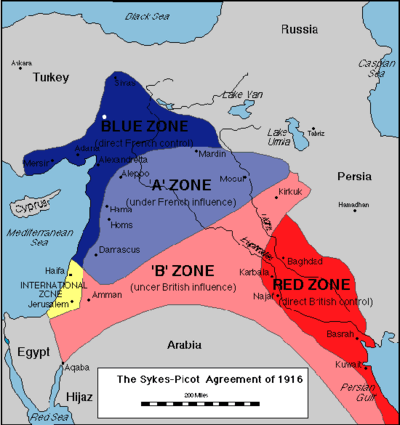 |
Few American have heard of the Sykes-Picot agreement of May, 1916, although today it's a matter of widespread interest in the Arab world, and is considered to be a piece of Western treachery that has caused untold misery in the Arab world for the last century.
This year is the 100th anniversary of the Sykes-Picot agreement, named after Frenchman Francois Georges-Picot and Briton Mark Sykes. The secret agreement was reached on May 9, 1916, and signed a week later by Britain, France and Tsarist Russia on May 15, 1916. The purpose of the agreement was to split up the remains of the Arab countries after the defeat of the Ottoman Empire, which had ruled them for centuries.
During the British fight against the Turkish Ottomans, the British had obtained the help of Arab armies by promising that after the war there would be a truly independent Syrian state that included Palestine, Transjordan, and Lebanon. However, that promise was made in the knowledge that it would be betrayed, because the secret Sykes-Picot agreement described how the region would be split between France and Britain as their respective colonies. The betrayal was exposed when the secret agreement was revealed, and that occurred after the Bolshevik Revolution in Russia, when Leon Trotsky published the details of the deal in November 1917.
The next betrayal was the Balfour Declaration by the British in 1917, promising the establishment of a Jewish state in Palestine.
The borders set by Sykes-Picot/Balfour have remained largely intact, with few exceptions. There was the independence of Sudan from Egypt, and then the secession of South Sudan. North and South Yemen were unified, as were the United Arab Emirates (UAE). There were also changes to the Palestinian territories and Palestine, related to the establishment of Israel.
But there are many Arabs, especially Palestinians, who blame Sykes-Picot/Balfour as the source of all their misery. The so-called Islamic State (IS or ISIS or ISIL or Daesh) has specifically said that Sykes-Picot is dead, but other nationalist Arab groups are calling for its abolition, mostly for local political reasons. The Kurds have been leading the calls for an end to Sykes-Picot, and the creation of a Kurdistan state.
In the past two decades, and especially since the "Arab Spring" of 2011, the Arab world has been disintegrating, with wars in Syria, Libya, Iraq and Yemen. Many Arabs blame todays troubles on the Sykes-Picot agreement that was signed a century ago.
From the point of view of Generational Dynamics, to suggest that the Arab world has disintegrated in the war because of an agreement signed in 1917 is nonsense. The Mideast has been in an almost constant state of war for centuries, and no Western agreement could have either caused or prevented further wars. As I've been writing for years, the entire Mideast is headed for massive sectarian and ethnic wars, and those wars are coming about because of powerful generational forces that no politicians can control.
The Gulf News has done a series of articles on the effects of the Sykes-Picot agreement on different Mideast countries, and those articles are summarized in the sections below. Globe and Mail (Canada) and Sputnik News (Moscow) and Deutsche Welle
As the Ottomans were leaving Syria in 1920, the French forces landed on Syria's coast and started marching toward Damascus, with the specific objective of taking control of France's share of the Sykes-Picot agreement. The French crushed the Syrian army, imposed martial rule, and divided Syria into border-free mini-states. Syria's borders with the British Mandate Palestine, the newly-created State of Greater Lebanon, and the newly created emirate of Transjordan were all set by the French.
Syria declared a republic in 1932, and became independent in 1946, when it was a co-founder of both the Arab League and the United Nations.
Egyptian President Jamal Abdul Nasser merged Syria and Egypt in 1958 to form the United Arab Republic (UAR). It lasted only 43 months, and crashed in September 1961. The UAR was an attempt to reshape the borders defined by Sykes-Picot, however it failed and the original borders are still standing. Gulf News (Dubai) and Gulf News
As the Ottoman armies retried, the British, with the help of their Arab allies, conquered Palestine and all of Greater Syria. The British administered Palestine directly until they received a mandate from the League of Nations that ran from 1923 to 1948. At the same time, the British favored the Zionist agenda of creating a protectorate and a government based on "some kind of Council to be established by the Jews."
This was formulated in 1917 by the Balfour Declaration, issued by British Foreign Secretary Arthur Balfour that, "His Majesty’s government view with favor the establishment in Palestine of a national home for the Jewish people, and will use their best endeavors to facilitate the achievement of this object." This is considered by the Arabs to be a double-cross, a betrayal of well-documented British promises to seek an Arab government of the territories liberated from the Ottomans.
In the decades that followed, Jewish colonies and Zionist aspirations advanced steadily, culminated in the 1948 Naqba ("Catastrophe"), the creation of the State of Israel, and the bloody crisis war that evicted more than 700,000 Palestinians from their homes. For Arabs, and especially Palestinians, this is the savage legacy of the Sykes-Picot agreement and the Balfour Declaration, causing enormous suffering and misery to the present day. Gulf News (Dubai) and Gulf News
Lebanon has existed for thousands of years, home of Christians, Muslims, Druze, Maronites, and others. Lebanon came out pretty well in the 1919 Paris Versailles Peace Conference. One reason was sympathy for Lebanon because during the war, an Ottoman embargo lead to a famine in which 200,000 died in Mount Lebanon alone. So Lebanon survived intact, and elected a president in 1926. The French mandate was terminated with independence in 1943. Gulf News (Dubai)
(Comments: For reader comments, questions and discussion, see the 10-May-16 World View -- Arab countries seek to overturn the century old Sykes-Picot agreement thread of the Generational Dynamics forum. Comments may be
posted anonymously.)
(10-May-2016)
Permanent Link
Receive daily World View columns by e-mail
Donate to Generational Dynamics via PayPal
Bolivia accuses Chile of setting up military base near border
This morning's key headlines from GenerationalDynamics.com
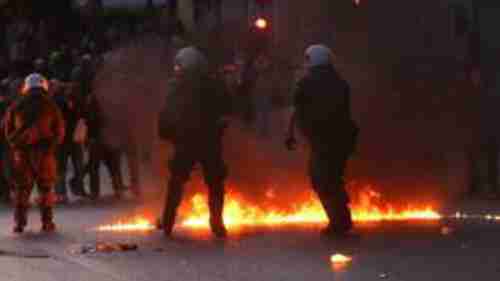 |
Greece's parliament on Sunday voted on a new set of harsh austerity measures that lending institutions are demanding of Greece in order to receive new bailout loans and stave off bankruptcy.
Almost 15,000 people turned out in Athens and Thessaloniki to protest the planned austerity measures. The demonstrations were mostly peaceful, but a small group of anarchist protesters hurled firebombs, Molotov cocktails and other projectiles at police in Syntagma Square in front of Parliament. Police responded with bursts of tear gas to repel the anarchists.
By Sunday, Greece was in the grip of labor strikes that have paralyzed public transport across the country, and shut down other public sector services.
The move to impose the harsh austerity measures is being led by Greece's far-left prime minister Alexis Tsipras, who performed a mind-bending U-turn last year. Tsipras was elected early last year by promising that there would be no more austerity measures. After being elected, he repeatedly lied and promised reforms with no intention of implementing them. After months of one crisis after another, Tsipras final had to agree to implement the harsh austerity measures demanded by Greece's lenders, because European officials were "holding a knife at my neck." Kathimerini and AFP
Greece has almost been forgotten, after living with six years of austerity, with 25% unemployment, and having to deal with more than a million refugees reaching the country, receiving little sympathy and no help to speak of. That crisis is far from over, with 50,000 migrants still in Greece, many awaiting the outcome of asylum applications.
A typical story is that of Dimitris, a retired 75-year-old construction worker who has to live on a measly 406 euros ($463) per month, and now even that will be cut. He says,
"I had to help on the farm when I was 5, later I became a truck driver, then a construction worker, and in my later years I was a subcontractor in the building industry. I slaved away my whole life until I had my heart attack. And it was all for nothing!"
If his pension is cut further, Dimitris would be forced to ask for money from his children - who themselves are barely getting by.
But in fact, the austerity measures being voted are reductions in pensions and sharp increases in taxes on gasoline, tobacco, cable television and gambling on Sunday. There may also be an internet tax and a special levy on bank transactions, and value-added tax is to be raised to 24%, too. Deutsche Welle and Kathimerini and Scotsman
Bolivia's President Evo Morales accused Chile on Sunday of threatening Bolivia by establishing a military base 15 km (9 miles) from their shared border. He added that international norms prohibited installing military bases less than 50 kilometers (30 miles) from international borders in order to avoid confrontations.
Chile denied the accusation, and said that no such military base exists.
Bolivia and Chile are still in disagreement over the outcome of the War of the Pacific, 1879-83, involving Bolivia, Chile and Peru. As a result of that war, Chile acquired two provinces that had formerly belonged to Bolivia and Peru, respectively. The land acquired from Bolivia was about 120,000 sq km in size, roughly the size of Greece. In addition, Bolivia lost its coastline, and has been landlocked every since. Furthermore, the acquired provinces have turned out to have large copper deposits that have made Chile the world's largest copper producer.
In 2013, Bolivia took Chile to the International Court of Justice in The Hague in the dispute that has been extremely bitter for over a century. Reuters and BBC (24-April-2013) and Library of Congress
(Comments: For reader comments, questions and discussion, see the 9-May-16 World View -- Workers riot as Greece braces for new austerity measures thread of the Generational Dynamics forum. Comments may be
posted anonymously.)
(9-May-2016)
Permanent Link
Receive daily World View columns by e-mail
Donate to Generational Dynamics via PayPal
Hooded anarchists in Italy turn violent on Austrian border
This morning's key headlines from GenerationalDynamics.com
 |
45,000 or more protesters gathered in Warsaw, Poland, on Saturday for pro-European Union anti-government demonstrations.
The ruling Law and Justice party came to power in a landslide October election win, and have severely restricted human rights with reforms to the constitutional tribunal, public media, civil service and surveillance laws. These reforms have been criticized by European Union officials as contrary to EU principles of democracy.
Saturday's protests were the biggest in Poland since 1989 and the fall of Communism. In recent years, there have been an increasing number of mass protests in cities across Poland, often with contradictory objectives, as if people wanted to protest just for the sake of protesting. The protests are on both sides of the political spectrum. There have been similar situations in Hungary, Romania, and the Czech Republic.
In Hungary, the divisions are so deep that, according to one observer, the two social camps read different newspapers and use completely different arguments that are oblivious to the perspective of the opposing side. These divides often cut across families, friendships and professional circles. Radio Poland and Visegrad Insight
Over 1,000 far-right extremists chanted "Merkel must go" and "No Islam on German soil," and protested the immigration policies of Chancellor Angela Merkel. However, the anti-Merkel protests drew only a small fraction of the numbers that the organizers had predicted. A similar rally in March drew 3,000.
Also, there was a sizeable counter-demonstration of around 4,500 people in support of Merkel. The confrontation between the two sides was mostly peaceful, with only small outbreaks of violence.
A third rally of about 3,000 people, organized by regional Protestant churches, was billed as a "stroll for worldly openness and tolerance" from the Brandenburg Gate to the city's central Gendarmenmarkt square. Express (London) and Deutsche Welle
Hundreds of hooded "anarchist" protesters assembled in Italy on the border with Austria on Saturday and clashed violently with police during a demonstration against the Austrian government's plans to erect a fence at the Brenner Crossing between Italy and Austria, which would block asylum seekers from crossing from Italy into Austria.
It's estimated that about 30,000 migrants have reached Italy so far this year, mostly crossing the Mediterranean Sea from Libya by boat, and Austrian authorities have expressed the fear that masses of migrants would try to enter Austria.
Austria's Interior Minister Wolfgang Sobotka has said he believed that that as many as a million migrants were poised to cross the Mediterranean from Libya this year. Italy says the figure is likely to be much lower.
The protest at Brenner Pass turned violent on Saturday, with Italian police firing teargas at hundreds of protesters throwing stones and firecrackers. It was the third violent demonstration to take place at the Brenner Pass in just over a month.
Both German Chancellor Angela Merkel and Italian Prime Minister Matteo Renzi warned that unless the European Union found a common migration stance, old nationalist ghosts would reawaken. According to Merkel:
"Either we defend our external borders and we do it together or we risk falling back into nationalism. This is not a challenge for Greece, Germany or Italy, but these are challenges that have to do with the future of Europe."
Jean-Claude Juncker, European Commission president, said on Saturday that Austria imposing controls on its border with Italy would be a "political catastrophe" for Europe. Vice News and Washington Post and Reuters and The Local (Austria)
(Comments: For reader comments, questions and discussion, see the 8-May-16 World View -- Far right and far left clash in Europe over government policies thread of the Generational Dynamics forum. Comments may be
posted anonymously.)
(8-May-2016)
Permanent Link
Receive daily World View columns by e-mail
Donate to Generational Dynamics via PayPal
London elects Sadiq Khan as mayor, the first Muslim mayor of a major Western city
This morning's key headlines from GenerationalDynamics.com
 |
Sadiq Khan, the 45-year-old son of a bus driver from Pakistan, was elected mayor of London in an extremely bitter contest against his main rival, Zac Goldsmith, the son of a billionaire businessman.
Goldsmith was accused of running a divisive and racist campaign for referring to Khan with such labels as “radical” and “dangerous,” which were as code for his religion. The tactics may have backfired, as Khan won overwhelmingly, 57% to 43%.
In a fascinating twist, Goldsmith's sister, Jemima (Gemima) Marcelle Goldsmith, is a journalist who was married to Imran Khan, whom I've written about many times. (See "20-Aug-14 World View -- Pakistan's army called to quell massive anti-government protest")
Imran Khan was one of Pakistan's greatest cricket players of all time, and was once voted as the "Sexiest Man of The Year" by Australia Magazine Oz. He turned to politics in the 1990s, and has become an extremely colorful and extremely anti-American politician. Jemima, who is Zac Goldsmith's sister and Imran Khan's ex-wife, congratulated the new mayor, describing him as a “great example to young Muslims.”
There's another fascinating twist: Sexy, well-known Daily Mail columnist Katie Hopkins wrote in her column on Wednesday:
"Vote Zac. Because if you don't, I'll run Regent Street naked with a sausage up my bum. I’ve even Tweeted as much. And if that horrifying prospect doesn’t get the Zac vote out, nothing will."
Now that Sadiq Khan has won, Hopkins' office is not returning phone calls on whether she intends to fulfill her pledge. Daily Mail (London) and LA Times and Telegraph (London)
A furious Turkish president Recep Tayyip Erdogan on Friday rejected a requirement of the EU-Turkey migrant that Turkey bring its anti-terror laws in line with EU standards, which is required for the lifting of EU visa restrictions for Turkish citizens.
The fallout from the resignation of Turkey's prime minister Ahmet Davutoglu, which we reported yesterday, did not take long to emerge.
It's beginning to be apparent that the EU-Turkey migrant deal was the last straw that caused president Recep Tayyip Erdogan to force Davutoglu to resign, after the stormy meeting they had on Wednesday evening. Davutoglu was Turkey's main negotiator for the deal, and according to reports, Davutoglu agreed to some things that Erdogan was opposed to.
As we reported in detail yesterday, the crux of the migrant deal is turning out to be the requirement that the EU lift visa restrictions and give citizens of Turkey visa-free travel throughout the 26 nations of Europe's Schengen Zone. There are 72 requirements imposed by the EU for the visa restriction to be lifted, and Erdogan is apparently furious that Davutoglu agreed to meet all requirements. Erdogan believes that Turkey has so much leverage in the deal, because of the EU's desperation in handling the migrant crisis, the Davutoglu did not have to concede so much.
Turkey's anti-terrorism laws are so broad that they criminalize almost any kind of political dissent, and are used to arrest journalists and academics critical of government policies. They were used as justification for the seizure of the country's largest newspaper, Today's Zaman, because it criticized Erdogan's policies. ( "6-Mar-16 World View -- Turkey's 'shameful day for free press' as government seizes Zaman media")
Erdogan on Friday said that the anti-terror laws would not be changed:
"While Turkey is under attack from terrorist organizations from all sides, the European Union is telling us to change the anti-terror law in exchange for the visa deal. You, the EU, will let PKK terrorists build tents near the EU parliament in Brussels, provide them opportunities in the name of democracy, and then tell us you will lift visas if we change our anti-terror laws. Sorry. We'll go our own way, you go yours."
Erdogan was alluding to a tent set up by supporters of the Kurdistan Workers’ Party (PKK) in front of the European Council building, just two days after a major terrorist attack on Ankara on March 13, as Davutoglu was visiting Brussels. It was only after the terrorist attack on Brussels on March 22 that Belgian police ordered the tent to be taken down, but then it was set up again elsewhere. Turkish officials were furious that PKK supporters were permitted to publicize their cause just after a terrorist attack.
Erdogan's has issued a "take it or leave it" ultimatum to the European Union. He believes, probably correctly, that the EU is so desperate for the EU-Turkey migrant deal that they'll make this concession, and possibly other concessions as well, and lift the visa restrictions by the June deadline. Anadolu News (Turkey) and Irish Times and BBC
The European Union has 72 requirements a country must meet in order for visa restrictions to be lifted, so that citizens can travel freely around the 26 countries of the Schengen Zone. Almost all of the requirements have already been met, but five remain:
Turkey's EU Minister and Chief Negotiator Volkan Bozk r claims that much has already been done to fulfill the first four of these requirements:
"The readmission agreement will go in effect in June. The law that will allow judicial cooperation with all EU member states has recently been approved by Parliament and there is no problem with that. The data protection law was required to enhance cooperation with Europol, so it will also be done. We have also made significant progress implementing the recommendations of GRECO. Strengthening the data protection authority can be done. ...[With regard to the fifth requirement:] The EU wants us to narrow the scope of the definition [of terrorism]. We already made the necessary changes to the anti-terrorism law in line with EU norms. The concept of immediate and obvious danger that threatens public security was introduced with these changes. However, we don't have the luxury of making these changes while the intensive fight against terrorism is ongoing."
Bozk r also addressed one of the main concerns that many EU officials have about lifting the visa restrictions for all of Turkey's 70 million citizens: That there will be a flood of asylum seekers from Turkey looking for jobs in Europe. According to Bozkir, the concern is irrelevant:
"There are about 1.5 million migrants who went to Europe, but nearly no Turkish citizens were among them. There is no single asylum application from a Turkish citizen. We will explain this to our European friends and will convince them."
(Comments: For reader comments, questions and discussion, see the 7-May-16 World View -- Turkey's Erdogan threatens EU: 'We'll go our own way, you go yours!' thread of the Generational Dynamics forum. Comments may be
posted anonymously.)
(7-May-2016)
Permanent Link
Receive daily World View columns by e-mail
Donate to Generational Dynamics via PayPal
With Turkey already in chaos, Erdogan forces PM Davutoglu to resign
This morning's key headlines from GenerationalDynamics.com
 |
I always thought that Turkey's prime minister Ahmet Davutoglu was like Russia's prime minister Dmitry Medvedev. Medvedev is a puppet who does what Russia's president Vladimir Putin tells him to do, apparently without question. I've thought that Davutoglu was also a spineless puppet doing the bidding of Turkey's president Recep Tayyip Erdogan, and a lot of other people have thought the same.
But that apparently isn't true. Davutoglu has apparently vigorously opposed several of Erdogan's policies. According to reports, there was a stormy meeting on Wednesday evening between Erdogan and Davutoglu, leading to Davutoglu's resignation as prime minister and as leader of the governing AK party.
Davutoglu, a former professor, made it clear that recent events made it impossible to support Erdogan's policies as a matter of conscience, although he would remain loyal to Erdogan:
"My term [as prime minister] was one of success. With this decision, there is no feeling of unsuccessfulness or regret over what I have done. I did my job properly and with honor.The fact that my term lasted far shorter than four years is not a decision of mine but a necessity. Our party is on the verge of a new era. This is the time of unity. ...
Especially after six months of the elections in which our party received 49.5 percent of the votes and the support of 24 million voters. Why is the AKP’s leader leaving while all three opposition leaders who lost the elections are still there?” he added.
Well, why have I taken such a decision? Life teaches many things, but I have my principles that I have never left since my academic days.
The strongest person in life is the one who can be at peace with himself,” the prime minister said. “In life, I have never defended anything I have not believed and I have never taken a step back on issues I have believed in. I have never negotiated for any post or position over the values and principles I have. ...
Therefore if friends are important and the objective is important, then we should all examine ourselves. As a result of my own examination and consultations with my friends with political experience, including our president, I have come to the conclusion that instead of changing colleagues, it’s much better to change the party chair for the unity of the AK Party. ...
[T]he fate of the AK Party is the fate of Turkey. Whatever will happen, I will continue my relation with our president [Erdogan] ... until my last breath. The honor of our president is my honor. His family is my family. No one should dare to initiate new plots."
Under Erdogan, Turkey has been moving in the direction of a dictatorship.
There will be an AK Party congress later in May, where Erdogan is expected to select a new prime minister who will be much more obedient and compliant. One possible successor would be Erdogan's son-in-law.
Whatever else happens, Turkey is already is a state of political chaos. There have been regular terrorist attacks by the Kurdistan Workers' Party (PKK) and by the so-called Islamic State (IS or ISIS or ISIL or Daesh). The government war against the PKK has led to actual fistfights in Turkey's parliament. And Russia's boycott of Turkey has caused economic hardships. Hurriyet (Ankara) and VOA
It's thought that there's too much at stake for both sides to allow a political dispute between Erdogan and Davutoglu to endanger the EU-Turkey migrant deal. Nonetheless, the resignation gives ammunition to opponents of the deal in both the EU and Turkey to argue that the deal should be scuttled.
The crux of the deal is the agreement to lift visa restrictions by the end of June, so that citizens of Turkey can travel freely around the 26 countries in Europe's Schengen Zone without a visa. This is something that Turkey has wanted for years, as it's enormously popular with Turkey's citizens, and it was a key demand of Turkey in making the migrant deal.
However, lifting the visa restrictions is very controversial in some parts of the EU, and the policy change is expected to face stiff opposition when the European Parliament votes on it within a few weeks. Opponents point to the fact that Turkey has not met all the preconditions for lifting the restrictions, including freedom of the press and human rights. The resignation of Davutoglu will allow opponents to say that Turkey is becoming less democratic and more authoritarian, and therefore doesn't qualify for lifting the visa restriction.
The same issue about lifting visa restrictions is a thorn in the side of Erdogan, because it places a number of restraints on Erdogan's policy changes. The EU can threaten to restore the visa restrictions at any time if Erdogan becomes too authoritarian, and so the agreement effectively places restraints on Erdogan's otherwise unrestrained policies.
Prime minister Davutoglu has offered a cautious counterweight to an increasingly radical president, who increasingly defines himself against Western values and goals. By replacing his hand-picked prime minister with someone still more subservient, Erdogan will get the power he seeks, unless he's stopped by the chaos that's likely to follow Davutoglu's resignation. Bloomberg and Euro News and Daily Sabah (Ankara)
At least 30 people were killed on Thursday when warplanes struck a refugee camp in northern Syria, killing many women and children. It's believed that the warplanes were from either Russia or the Syrian regime of president Bashar al-Assad.
The people living in the refugee camp were civilians who had fled the Russian warplanes bombing Aleppo. As we wrote in February, Russia is following a policy used against Grozny in the 1990s war against Chechnya. ( "19-Feb-16 World View -- Russia's attacks on civilian hospitals in Aleppo follow the 'Grozny model'")
Under this policy, Russia bombs schools, hospitals and civilian neighborhoods, in order to create a a refugee crisis, and to empty the urban residential areas. Once that is achieved, heavy weapons can be deployed to eradicate the remaining population, entailing widespread destruction of homes and infrastructure.
United Nations Secretary-General Ban Ki-moon has warned that the policies of Syria and Russia are going to cause a humanitarian disaster, resulting in a flood of 400,000 refugees pouring into Turkey. Turkey has tried to set up refugee camps in northern Syria along the Turkish border, in order to prevent such a flood of refugees. Russia and Syria have been following the Grozny Model to eradicate the civilians in Aleppo, and now are bombing the refugee camps in order to make sure that the refugees pour into Turkey, from which they may once again flood into the Greece and the European Union.
The Syrian regime, which practices genocidal war crimes every day with barrel bombs and chemical weapons, and considers all Sunni Muslims as terrorist cockroaches to be exterminated, issued a statement saying that Aleppo has become like the heroic Stalingrad and gave a promise that "despite the brutality and cruelty of the enemy, and the great sacrifices and pains, our cities, towns, people and army will not be satisfied until they defeat the enemy and achieve victory serving the interests of Syria, the region and the world." VOA and Syria Online
(Comments: For reader comments, questions and discussion, see the 6-May-16 World View -- Syria and Russia continue 'Grozny Model,' killing women and children in Aleppo refugee camp thread of the Generational Dynamics forum. Comments may be
posted anonymously.)
(6-May-2016)
Permanent Link
Receive daily World View columns by e-mail
Donate to Generational Dynamics via PayPal
European Commission threatens to fine countries that won't accept migrants
This morning's key headlines from GenerationalDynamics.com
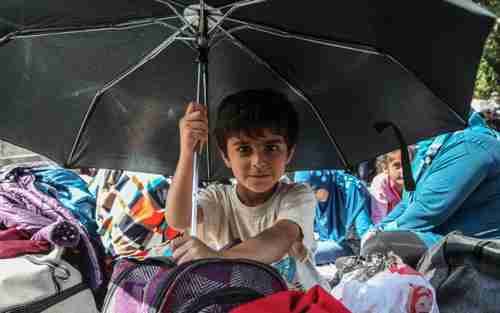 |
Britain's prime minister David Cameron has made a U-turn in policy, and has announced that the UK will take thousands of unaccompanied children in refugee camps in the EU.
The UK already takes children from refugee camps in Syria and surrounding countries, but under the new policy will also take children who are already in Europe.
Cameron has opposed the change of policy because it would encourage more families to entrust their children to human traffickers to take them to Europe. For that reason, Cameron is restricting the policy to children registered in Greece, Italy or France prior to March 20, the date of the EU-Turkey refugee deal.
According to Cameron:
"I am also talking to Save the Children to see what we can do more, particularly about children who came here before the EU-Turkey deal was signed.What I don't want us to do is to take steps that will encourage people to make this dangerous journey because otherwise our actions, however well-meaning they will be, could result in more people dying than more people getting a good life."
Local authorities across Britain will be asked to find homes for the children. The exact number of children was not announced, but it's assumed to be around 3,000. Each child will cost £50,000 to resettle. Guardian (London) and Catholic News Service and BBC
The EU-Turkey deal requires Turkey to take back all migrants who travel from Turkey to Greece and are not given asylum. This applies to the thousands of migrants who are already in refugee camps in Greece.
The deal contains a somewhat bizarre "one-for-one" provision that says that, for each Syrian refugee that Greece returns to Turkey, Turkey will select a Syrian refugee from its refugee camps and send that refugee back to the EU. The plan is that these refugees will be distributed to all 28 EU countries under a quota system.
The EU tried a migrant quota system last year that was supposed to relocate 160,000 refugees from Greece and Italy to other EU countries. Only about 1,100 refugees were resettled under this plan because of stiff opposition from Central European countries, including Hungary, Slovakia, the Czech Republic, Poland and Romania.
So now the European Commission (EC) is faced with implementing a quota system for the EU-Turkey deal, and their proposal includes a "fairness mechanism" under which each of the 28 member states would be assigned a percentage quota of all asylum seekers in the bloc that it would be expected to handle. The quota would be reflect national population and wealth.
It's clear that the same Central European countries are going to oppose the new quota system, and so the EC is going to permit them to opt out for at least a year, provided that they pay a fine of 250,000 euros ($300,000) for each asylum seeker that they refuse to accept.
"It is blackmailing. It's a dead-end street," according to Hungary's foreign minister, Peter Szijjarto.
Polish Foreign Minister Witold Waszczykowski said of the proposal: "I'm still wondering if it's a serious proposal, because it sounds like an idea announced during the April Fool's Day."
The EC proposals will be voted by the European Parliament in June. They require a majority vote, which means that they can be enacted over the opposition of the Central Asian countries. VOA and Reuters
When US Secretary of State John Kerry visited Hiroshima, Japan, last month, he attended a commemoration that laid a wreath at the altar of the Hiroshima Peace Memorial Museum, but specifically refused to apologize for the nuclear bombing of Hiroshima in 1945. However, he left unanswered the question of whether President Obama would apologize when he visits Hiroshima on May 24.
Speculation apparently ended on Monday afternoon when Obama's press secretary Josh Earnest supposedly told reporters that Obama would not apologize.
When this report is confirmed, that will be the culmination of a debate which pits the editorial boards of the Washington Post, the New York Times, and other mainstream media newspapers, who are demanding that Obama apologize, versus a broad coalition of officials in Asia that oppose any such apology.
An Obama apology would also be politically divisive in the United states, as it would support the Republican view that Obama is "weak," and would aid the nationalist Donald Trump candidacy. Washington Post (10-Apr) and Lowy Institute (Australia) and Nikkei Asia Review
(Comments: For reader comments, questions and discussion, see the 5-May-16 World View -- Many in Asia oppose an Obama apology for 1945 nuking of Hiroshima thread of the Generational Dynamics forum. Comments may be
posted anonymously.)
(5-May-2016)
Permanent Link
Receive daily World View columns by e-mail
Donate to Generational Dynamics via PayPal
Reader question on Iran and Iraq's Muqtada al-Sadr
This morning's key headlines from GenerationalDynamics.com
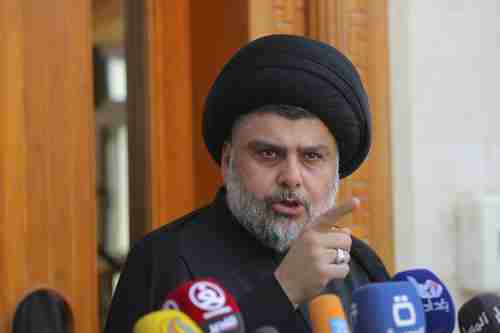 |
My recent article "2-May-16 World View -- Iraq government faces climatic Awakening era political crisis" evoked some reader questions, mostly about the relationship between Muqtada al-Sadr and Iran:
"Hey John, if you're still reading the comments, I'd love to have an answer to a layman's question, and I value your insight. What are the chances that Iraqi Shia al-Sadr is financed by the Iranian Shia, located in Tehran?
This is a very interesting question today (Tuesday), because al-Sadr has apparently shocked his supporters today by making an unannounced visit to Tehran. The visit is apparently embarrassing to both Iran and al-Sadr, since early reports from Iran's media denied that any such visit was taking place.
There's really no great love for Iran among Iraqi Shias. Recall Iraq's last generational crisis war. It was the Iran/Iraq war that climaxed in 1988 with Saddam Hussein's use of chemical weapons on the Kurds and the Iranians. It was a war between Iran and Iraq, not between Sunnis and Shias. Memories of that extremely bloody and brutal war are still fresh and deeply embedded in the minds of both Iraqis and Iranians today.
Al-Sadr himself has been carving out a largely nationalist non-sectarian path, trying to appeal to both Sunnis and Shias in Iraq. In Saturday's protests, his supporters were vocal about their hatred for Iran, so it's unlikely that Iran has been providing much support to al-Sadr.
If Iran has been supporting anyone, it would be the government of prime minister Haider al-Abadi, who depends on Iran for military support in fighting ISIS.
But even if Iran is not supporting al-Sadr, Iran undoubtedly has leverage over al-Sadr. There may also be the involvement of al-Sadr's "boss", the senior cleric al-Sayyid Ali al-Sistani, born in 1930. He grew up during Iraq's last generational Awakening era, so he's seen it all before, and may be acting as a mediator between Iran and the youthful al-Sadr.
(The political chaos in Iraq's generational Awakening era today is very similar to the 1930s Awakening era, as I described in my April 2007 article, "Iraqi Sunnis are turning against al-Qaeda in Iraq".)
At any rate, it's quite possible that when al-Sadr told his followers to retreat on Sunday, he was forced to do so by Iran. And he's visiting Iran today because he's been ordered to.
There may also be a threat of massive violence. Iran, Syria and Russia all have the policy of meeting peaceful protests with massive violence, filling the streets with dead bodies and rivers of blood, bludgeoning, massacring, torturing and mutilating peacefully protesting women and children, rather than allow anyone to peacefully protest against the government. Iraq's government didn't do anything like that on Saturday, but it's possible that Iran is threatening to use its own Revolutionary Guards military to massacre al-Sadr's protesters if they protest again.
The situation is that al-Sadr has called for massive protests after Friday prayers at the end of this week. Iran undoubtedly wants al-Sadr to call them off. But if al-Sadr calls off the protests after going to Tehran, then his protesters will be furious, and may become violent, triggering a violent response. So Friday should be interesting.
Some analysts are saying that Iraq's current Shia-led government is on the verge of collapse, because the Shias are fighting among themselves. According to Kurdish official Muhammad Ahmad, a former member of Iraq's parliament:
"There are historically three factors behind Shiite unity: when they face a common adversary, when they are guided by their supreme religious leaders, when they are told and directed by Iran. At the moment their common enemies are not so powerful and that has left some space for inter-Shiite tensions. I expect it to become even harsher. ...[The] Sunnis have been left with no real power. At the moment they have no land, they have no wide popular support and consequently their political power is very much weakened. It wouldn’t be all too wrong to say that the Shiites no longer are intimidated by the Sunnis or Kurds. That is why the rivalries within the Shiite block have intensified."
So your question was: "Is al-Sadr financed by Iran?" My guess is that the answer is NO, but al-Sadr is THREATENED by Iran, at a time when Iraq's entire Shia government is threatened by an existential political crisis from within. Asharq Al-Awsat (London) and Press TV (Tehran) and Rudaw (Iraq, Kurdistan)
European media are reporting that the European Commission (EC) will back visa-free travel for Turkish citizens when they make their recommendations on Wednesday.
The recommendation would apply to the Schengen Zone, which is a group of 26 European countries that permit visa-free border crossings among them. Last year, because of the flood of migrants entering Europe, some Schengen zone countries imposed border controls under the "emergency situation" terms of the Schengen rules. However, with the closing of the "Balkan Route" for migrants, many of these border controls are being lifted.
If the EC recommendation is adopted, then citizens of Turkey will be able to travel anywhere within the Schengen zone without a visa. The UK, Ireland and Cyprus are not in the Schengen zone, so those countries will continue to impose a visa requirement.
Turkey had demanded that the visa requirement be scrapped as part of the EU-Turkey deal to handle Europe's migrant crisis. Turkey agreed to take back migrants who land in Greece, but agreed only on condition that the EU end the visa requirement by June.
The visa liberalization is extremely controversial in Europe. Turkey is an enormous country of 75 million people, and many Europeans fear that there will be a flood of Turkish citizens coming to Europe to look for work. However, the visa-free agreement will not grant Turks the right to get a job in Europe.
Germany and France have proposed an emergency brake or “snap back mechanism” under which it could halt visa-free travel if large numbers of Turks stay in the EU illegally or if there are a large number of asylum applications by Turks.
The EC's visa liberalization recommendation still requires approval by the EU parliament, where it is expected to meet with considerable opposition. Turkey is required to meet 72 separate conditions by May 4 to earn the visa liberalization.
It's thought that Turkey has met most but not all of the conditions. The failures are in two areas:
The EU-Turkey deal itself has raised human rights concerns, with activists claiming that Turkey is not a safe country to return migrants to.
However, EU officials believe that they have no choice but to approve the visa liberalization anyway, even if Turkey has not met all 72 requirements, because otherwise Turkey will cancel the migrant deal. BBC and Hurriyet (Ankara)
(Comments: For reader comments, questions and discussion, see the 4-May-16 World View -- European Commission expected to recommend visa-free travel for citizens of Turkey thread of the Generational Dynamics forum. Comments may be
posted anonymously.)
(4-May-2016)
Permanent Link
Receive daily World View columns by e-mail
Donate to Generational Dynamics via PayPal
Report: Hamas, Israel and Egypt in alliance fighting ISIS
This morning's key headlines from GenerationalDynamics.com
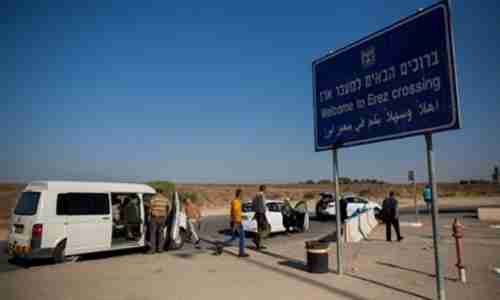 |
Because of the blockade of the Gaza strip by both Israel and Egypt, most of the food, medicine and other supplies reaching Gaza come through a single checkpoint, the Kerem Shalom crossing, between Israel and southeastern Gaza. Some 600-1000 trucks pass through the Kerem Shalom crossing every day, creating a hazard on some of the local roads.
Israel announced on Monday that it will open a second crossing to commercial traffic, through the Erez terminal on Gaza's northeastern tip. No implementation date has been given, but it's expected that the traffic will then be split between the two crossings.
Israel has imposed harsh restrictions on the kinds of goods that may be imported into Gaza. In particular, building materials like lumber, cement, and iron are restricted because they could be used to build tunnels and bunkers for use in war against Israel. However, officials complain that these restrictions prevent Gaza from rebuilding the homes that were destroyed since the 2014 war. The announcement made no mention of whether any of these restrictions will be lifted.
The announcement appears to be a goodwill gesture to Hamas. Israel halted commercial traffic through Erez in 2000, after the Palestinian intifada began, and only passenger transit has been allowed since. The decision to reopen the Erez crossing was taken in recognition that a truce that ended the 2014 war against Hamas is holding. Jerusalem Post and Reuters
Israel and Egypt have been in alliance for some time to fight Wilayat Sinai (State of Sinai), Sinai's branch of the so-called Islamic State (IS or ISIS or ISIL or Daesh). In the past, Egypt has accused Hamas, which governs the Gaza Strip, of allowing ISIS militants to use Gaza as a safe haven, and to allow them to cross into Sinai through smuggling tunnels. Hamas denies the allegations, saying it has no sympathies to the ISIS, which branded Hamas as infidels in a video two years ago.
Now the Washington Post is reporting that Egypt is pressuring Hamas to control its border and prevent any movement of fighters or couriers between Gaza and Sinai. Egypt has economic leverage on Hamas, as Hamas depends on Egypt in part for its economic survival.
Last week, Hamas deployed over 300 fighters to Gaza’s border with Egypt, to prevent ISIS militants from crossing over the border in either direction.
Being the generally suspicious person that I am, it's not clear to me how this will have any effect. If Hamas is providing a safe haven for ISIS militants and allowing them to cross into Egypt, then Hamas fighters will just let that continue. In fact, the Hamas fighters might actually provide cover for ISIS militants to cross back and forth.
According to Eyad al-Bozom, a Hamas spokesman, "The national security forces redeployed along the borders with Egypt, and it is part of the security plan to fully control the borders and the stability of it, as well as the security of our Egyptian brothers." Washington Post and Jerusalem Post
A question that Generational Dynamics seeks to answer is how the countries of Asia will line up for and against China in the South China Sea dispute and the coming Clash of Civilizations world war.
China's Foreign Minister Wang Yi announced that China had reached[2] a four-point consensus with Cambodia, Brunei, and Laos about resolving the South China Sea disputes. In particular, they all acceded to China's demand that the Association of South East Asian Nations (ASEAN) not play a part.
It's been clear for some time that Cambodia is firmly in China's camp, but Vietnam was shocked by the announcement, since they always consider Laos to be "brothers."
China has been annexing regions in the South China Sea that have historically belonged to other countries, and continues to use belligerent military operations to enforce its seizures. China has claimed the entire South China Sea, including regions historically belonging to Vietnam, Brunei, Malaysia, Indonesia, Taiwan and the Philippines.
Much of China's announcement is just symbolic, since neither Cambodia nor Laos have made any claims in the South China Sea. Brunei does have a conflicting claim, but China's announcement does not say that the three countries accept China's sovereignty. It only says that they've adopted China's bilateral process for resolving the dispute.
China's claims are rejected by almost everyone outside of China, and China refuses to submit them to the United Nations court deciding such matters, apparently knowing their claims are groundless and that they would lose.
However, a court is expected to issue a ruling in the next few weeks. The Philippines filed a case with the International Tribunal for Law of the Sea in 2013, challenging China's claims to the entire South China Sea. China has already reacted angrily to the Philippines' action filing the case, and if the court ruling goes against China, as many analysts believe it will, then China is expected to be furious, and may take further military action. China has repeatedly made it clear that it will never compromise in the South China Sea, and that it will take whatever military action is required to support its annexation of the region. The Diplomat and China Foreign Ministry and VOA
(Comments: For reader comments, questions and discussion, see the 3-May-16 World View -- Laos sides with China in South China Sea dispute thread of the Generational Dynamics forum. Comments may be
posted anonymously.)
(3-May-2016)
Permanent Link
Receive daily World View columns by e-mail
Donate to Generational Dynamics via PayPal
Muqtada al-Sadr and Iraq's Awakening era
This morning's key headlines from GenerationalDynamics.com
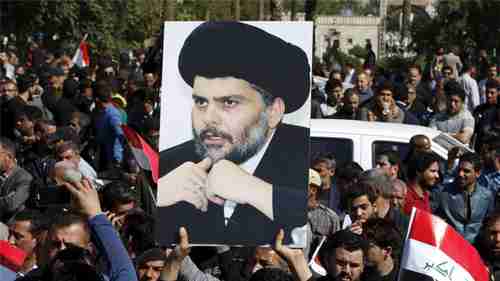 |
Iraq's government in Baghdad is facing a major political crisis after thousands of supporters on Saturday of Shia cleric Muqtada al-Sadr stormed the highly-secure "Green Zone" of Baghdad, and then moved on to the Parliament House. The air was festive, according to reports, as protesters took selfies while sitting in the chairs of the most hated politicians.
Under al-Sadr's orders, the protesters retreated from the Parliament House and the Green Zone on Sunday, but did so with a threat that new protests are planned for Friday. Since the "Arab Spring" began in 2011, the largest demonstrations have occurred as people poured out of mosques in the early afternoon after Friday prayers.
The Iraq government is under enormous pressure at the present time. Iraq is fighting the so-called Islamic State (IS or ISIS or ISIL or Daesh). There are currently two fronts, in Mosul and Ramadi, and it's thought that ISIS could easily penetrate Baghdad and other cities.
Iraq is also facing the prospect of bankruptcy. The government to pay out nearly $4 billion to 7 million people on the public payroll, including salaries and pensions to the military and to the workers in the bloated public-sector. But after the plunge in oil prices, from which Iraq gets more than 90% of its revenue, it's bringing only about half that amount, $2 billion.
Al-Sadr is accusing the government of prime minister Haider al-Abadi of massive corruption, and is demanding that the al-Abadi fire all his ministers and replace them with a technocrat government.
The political system that was put in place after the 2003 Iraq war set up a quota system, with required numbers of Shias, Sunnis and Kurds. The result was that government positions were granted based on patronage, leading to widespread corruption and poor public services. Al-Abadi has tried to end the quota system, but has met with overwhelming political resistance.
Al-Sadr is trying to force the issue by ordering his followers to carry out massive protests, and is threatening to bring down the entire government if changes are not made quickly.
If that happens, it would signal a major change in Iraq's government, and would be a generational Awakening era crisis, an event that settles the generational political conflict by establishing a victory of the younger generation. The climax of America's 1960s Awakening era was the 1974 resignation of Richard Nixon, which also signaled the victory of the generation of kids who grew up after World War II over the WW II survivor generations. Washington Post and Fox News and Washington Post (5-March)
Shia cleric Muqtada al-Sadr spent many years in hiding from Saddam Hussein, but after the Iraq war ended, he portrayed himself as an Iraqi nationalist, transcending the divide between Sunnis and Shia. His actions have largely been consistent with that role.
I've written about al-Sadr several times in the past, mostly during the Bush administration. In 2004, in "Al-Sadr's Shi'ite militia turn in weapons", al-Sadr was ordering his militias not to stage an anti-American Shia uprising. The context, throughout the Bush years following the Iraq war, was that the mainstream media, led by the NY Times and NBC News, were constantly predicting and promoting a disaster for the American army in Iraq. In 2004, the mainstream media were predicting a huge anti-American Shia uprising, but al-Sadr fooled them.
At one point in 2004, I wrote the following:
"Meanwhile, it's fun to watch how the mindless Boston Globe reporters cover all this. Tuesday's lead multi-column page one headline was "Shi'ites' uprising grows." That was wishful thinking, and by Wednesday the page one Iraq headline was, "Qaeda arrests called 'lucky' break." Today's headline is "Young marines frustrated by lack of progress." Each day's headline seems so moronic that it could never be topped, but the next day's is even more moronic. I don't know how they manage to do it."
Throughout those years, the mainstream media were predicting an imminent civil war in Iraq, making one dumb prediction after another, and always proven wrong.
In 2007, the mainstream media made complete fools out of themselves over Bush's "surge" announcement, predicting that it would be a complete disaster, and becoming completely humiliated when it worked.
In April, 2007, I wrote "Iraq's Moqtada al-Sadr says attack Americans, not each other". The word "attack" was an exaggeration by the mainstream media, but as a Reuter stories pointed out, al-Sadr was calling for peaceful demonstrations, not violence.
That's essentially what al-Sadr is calling for today, but this time the demonstrations are targeting the al-Abadi government in Baghdad.
Iraq's last generational crisis war was the Iran/Iraq war that climaxed in 1988, giving rise to the current generational Awakening era, and the generational conflict between the generations of survivors of that war versus the generations that have grown up after that war. It's that generational conflict that gives rise to the political chaos occurring today.
Iraq's previous generational crisis war was the 1920 Great Iraqi Revolution. That gave rise to political chaos in the 1930s that looked very similar to the kind of chaos that's occurring today.
I wrote about this history in detail in my April 2007 article, "Iraqi Sunnis are turning against al-Qaeda in Iraq", which is well worth reading by those interested in what's going on in Iraq today. Al-Jazeera(9-March)
(Comments: For reader comments, questions and discussion, see the 2-May-16 World View -- Iraq government faces climatic Awakening era political crisis thread of the Generational Dynamics forum. Comments may be
posted anonymously.)
(2-May-2016)
Permanent Link
Receive daily World View columns by e-mail
Donate to Generational Dynamics via PayPal
Kenya's huge ivory burning event may endanger elephants further
This morning's key headlines from GenerationalDynamics.com
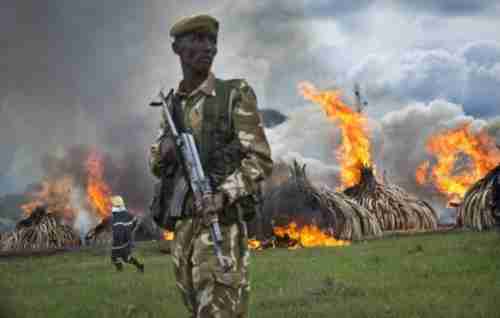 |
Kenya set fire on Saturday to 105 metric tons in 11 separate pyres, the tusks of nearly 7,000 elephants. This is 5% of the world's entire stock of ivory. In addition, 1.5 tons of rhino horns were set on fire. Ivory does not readily burn, but the fires are kept going by pumping a combination of kerosene and diesel into the pyres. The fires are expected to burn for several days.
Kenya's entire stock of ivory is being burned. The ivory was mostly collected from poachers and smugglers who had been responsible for killing thousands of elephants to obtain the ivory.
The spectacular ivory-burning show was accompanied by speeches full of wishful thinking by politicians. Kenya's president Uhuru Kenyatta said the following before lighting the first pile:
"Kenya is poor, but Kenya is a rich country with a heritage given to us by God and we intend to protect it.I have been told we are making a fundamental mistake in burning this ivory because we are poor. For us as Kenyans, Ivory is worthless unless it is on our elephants. ...
Let's do all we can to ensure our elephants are protected. Kenya's natural heritage can't be sold for money. With effective control over the movement of ivory, our elephants will be safe."
In case you're wondering how burning 105 tons of ivory is going to protect Kenya's elephants, it's because burning the ivory "sends a message" to poachers and smugglers that what they're doing is wrong and must be stopped.
This is now the fourth such burning that Kenya has held since 1989, but the poaching has only been increasing. In the 1970s, Africa had about 1.2 million elephants, but now has 400,000 to 450,000.
According to one report I heard, smugglers are not selling off their stocks of ivory. Instead, they're obtaining as much ivory as they can and storing it away, since it will only become more valuable as the number of elephants dwindles. It's not clear to me that these smugglers will stop what they're doing because of some "message" delivered by the burning.
In the excerpt above, Kenyatta said that he's been told that "we are making a fundamental mistake in burning this ivory." He's referring what many analysts are saying, that by burning off 5% of the marginal supply of the world's ivory, the price of ivory is going to skyrocket, with the result that many more elephants will be killed. In fact, South Africa, Botswana, Namibia, and other countries with large government stocks of ivory are holding on to it in the expectation of selling it at a much higher price.
Many people are saying that instead of burning the ivory, Kenya should have sold it off and given the money to the people whose villages have been attacked by wild elephants as compensation. This would have increased the supply of legal ivory in the world, and would have reduced the price of ivory, thus making poaching much less lucrative. The Star (Kenya) and National Geographic
Japan's foreign minister Fumio Kishida met with China's Premier Li Keqiang in Beijing on Saturday, with the intention of easing the enormous hostility between the two countries. The news reports were ambiguous about the outcome, but they seem to suggest that the meeting was pretty hostile.
One news report used an interesting phrase, "taking history as a mirror," that I haven't heard before:
"Li said China is willing, in the spirit of taking the history as a mirror and looking into the future, to make joint efforts with Japan to strengthen political mutual trust and promote bilateral relations back to the track of normal development."
According to China's Foreign Ministry, China made four demands of Japan to improve relations between the two countries:
"1. In the political area, the Japanese side should stick fast to the four political documents including the China-Japan Joint Statement, face up to and reflect upon the history and follow the one-China policy to the letter. No ambiguity or vacillation is allowed when it comes to this important political foundation of the bilateral ties."
The four documents refer to the China-Japan Joint Statement inked in 1972, the China-Japan Treaty of Peace and Friendship of 1978, the China-Japan Joint Declaration of 1998, and the joint statement on advancing strategic and mutually-beneficial relations in a comprehensive way signed in 2008.
China is still angry that Japan invaded China prior to and during World War II, using Chinese girls as "comfort women" for the soldiers, and committing the "Nanjing massacre" on December 13, 1937. The Chinese are critical of Japan's prime minister Shinzo Abe for recently sending a ritual offering to the Yasukuni Shrine in Tokyo. The Shrine, which honors Japan's war-dead, also enshrines 14 former Japanese leaders who were responsible Japan's attack on China.
Further, China is demanding that Japan recognize Taiwan as Chinese territory, not a self-governing nation, as Japan sometimes suggests.
"2. In terms of its outlook on China, the Japanese side should translate into concrete actions its consensus with China, that is, the two countries are each other's cooperative partners rather than threats. It should have a more positive and healthy attitude toward the growth of China, and stop spreading or echoing all kinds of "China threat" or "China economic recession" theories."
China is building a huge offensive military arsenal, preparing to launch war against, Japan, its neighbors in the South China Sea, and the United States. But if anyone asks China what they're doing, China accuses them of being warmongers and making threats. Point #2 demands that Japan stop complaining about China's massive military buildup and preparations for war.
"3. In terms of economic exchange, the Japanese side should establish the concept of win-win cooperation, discard the outdated idea that one side cannot do without the other side, or one side depends more on the other side than the other way around. Instead, it should enhance equal-footed and pragmatic cooperation with China in different fields based on mutual benefit."
This is an economic threat. In 2012, China declared economic war on Japan by terminating shipments of rare earth minerals, needed for manufacturing of many of Japan's electronic products. Also, Chinese protesters torched a Panasonic factory and Toyota dealership in China, looted and ransacked Japanese department stores and supermarkets in several Chinese cities. China's National Tourism Administration ordered travel companies to cancel tours to Japan. ( "18-Sep-12 World View -- China declares economic war on Japan, and sends 1,000 boat flotilla")
So when China talks about "win-win," it's a veiled threat that Japan must do as its told, or there may be another economic war.
"4. In terms of regional and international affairs, the two sides should respect each other's legitimate interests and concerns, and have essential communication and coordination in a timely fashion. The Japanese side should cast aside the confrontation mentality and work with China to maintain peace, stability and prosperity of the region."
China's message is this: "We want stability and peace. If you do exactly as you're ordered, then we'll have stability and peace. But if you don't do as you're ordered, then we'll kill you, and get stability and peace that way."
Generational Dynamics predicts that China and Japan are rapidly heading for a generational crisis war, and the time may not be far off. China Foreign Ministry and AP and Xinhua
(Comments: For reader comments, questions and discussion, see the 1-May-16 World View -- China makes four demands of Japan to improve relations thread of the Generational Dynamics forum. Comments may be
posted anonymously.)
(1-May-2016)
Permanent Link
Receive daily World View columns by e-mail
Donate to Generational Dynamics via PayPal
Web Log Summary - 2016
Web Log Summary - 2015
Web Log Summary - 2014
Web Log Summary - 2013
Web Log Summary - 2012
Web Log Summary - 2011
Web Log Summary - 2010
Web Log Summary - 2009
Web Log Summary - 2008
Web Log Summary - 2007
Web Log Summary - 2006
Web Log Summary - 2005
Web Log Summary - 2004
Web Log - December, 2016
Web Log - November, 2016
Web Log - October, 2016
Web Log - September, 2016
Web Log - August, 2016
Web Log - July, 2016
Web Log - June, 2016
Web Log - May, 2016
Web Log - April, 2016
Web Log - March, 2016
Web Log - February, 2016
Web Log - January, 2016
Web Log - December, 2015
Web Log - November, 2015
Web Log - October, 2015
Web Log - September, 2015
Web Log - August, 2015
Web Log - July, 2015
Web Log - June, 2015
Web Log - May, 2015
Web Log - April, 2015
Web Log - March, 2015
Web Log - February, 2015
Web Log - January, 2015
Web Log - December, 2014
Web Log - November, 2014
Web Log - October, 2014
Web Log - September, 2014
Web Log - August, 2014
Web Log - July, 2014
Web Log - June, 2014
Web Log - May, 2014
Web Log - April, 2014
Web Log - March, 2014
Web Log - February, 2014
Web Log - January, 2014
Web Log - December, 2013
Web Log - November, 2013
Web Log - October, 2013
Web Log - September, 2013
Web Log - August, 2013
Web Log - July, 2013
Web Log - June, 2013
Web Log - May, 2013
Web Log - April, 2013
Web Log - March, 2013
Web Log - February, 2013
Web Log - January, 2013
Web Log - December, 2012
Web Log - November, 2012
Web Log - October, 2012
Web Log - September, 2012
Web Log - August, 2012
Web Log - July, 2012
Web Log - June, 2012
Web Log - May, 2012
Web Log - April, 2012
Web Log - March, 2012
Web Log - February, 2012
Web Log - January, 2012
Web Log - December, 2011
Web Log - November, 2011
Web Log - October, 2011
Web Log - September, 2011
Web Log - August, 2011
Web Log - July, 2011
Web Log - June, 2011
Web Log - May, 2011
Web Log - April, 2011
Web Log - March, 2011
Web Log - February, 2011
Web Log - January, 2011
Web Log - December, 2010
Web Log - November, 2010
Web Log - October, 2010
Web Log - September, 2010
Web Log - August, 2010
Web Log - July, 2010
Web Log - June, 2010
Web Log - May, 2010
Web Log - April, 2010
Web Log - March, 2010
Web Log - February, 2010
Web Log - January, 2010
Web Log - December, 2009
Web Log - November, 2009
Web Log - October, 2009
Web Log - September, 2009
Web Log - August, 2009
Web Log - July, 2009
Web Log - June, 2009
Web Log - May, 2009
Web Log - April, 2009
Web Log - March, 2009
Web Log - February, 2009
Web Log - January, 2009
Web Log - December, 2008
Web Log - November, 2008
Web Log - October, 2008
Web Log - September, 2008
Web Log - August, 2008
Web Log - July, 2008
Web Log - June, 2008
Web Log - May, 2008
Web Log - April, 2008
Web Log - March, 2008
Web Log - February, 2008
Web Log - January, 2008
Web Log - December, 2007
Web Log - November, 2007
Web Log - October, 2007
Web Log - September, 2007
Web Log - August, 2007
Web Log - July, 2007
Web Log - June, 2007
Web Log - May, 2007
Web Log - April, 2007
Web Log - March, 2007
Web Log - February, 2007
Web Log - January, 2007
Web Log - December, 2006
Web Log - November, 2006
Web Log - October, 2006
Web Log - September, 2006
Web Log - August, 2006
Web Log - July, 2006
Web Log - June, 2006
Web Log - May, 2006
Web Log - April, 2006
Web Log - March, 2006
Web Log - February, 2006
Web Log - January, 2006
Web Log - December, 2005
Web Log - November, 2005
Web Log - October, 2005
Web Log - September, 2005
Web Log - August, 2005
Web Log - July, 2005
Web Log - June, 2005
Web Log - May, 2005
Web Log - April, 2005
Web Log - March, 2005
Web Log - February, 2005
Web Log - January, 2005
Web Log - December, 2004
Web Log - November, 2004
Web Log - October, 2004
Web Log - September, 2004
Web Log - August, 2004
Web Log - July, 2004
Web Log - June, 2004